Reviews | Genres and Artists | Q&A | Bibliography | Links
I have been reviewing and rating polka CDs since 2002. To read how I rate CDs, click here. If you're new to polka music, you might want to start with my overview of polka artists and genres. For further reading, this site also includes my thoughts on the history and marginalization of the polka, a bibliography of polka resources, links to important polka articles on the Web (both popular and scholarly), and some essential information for polka musicians. Your feedback is invited.
Reviews
New acquisitions
- Golden Horns on Green Fields:
Czech Polka Music from the Midwest - (Various artists, Polkaland CD-638, released 2003) Agricultural Heritage & Resources, a Wisconsin cultural group, produced this compilation to celebrate the brassy Wisconsin Bohemian style of polka music, a style which I find generally "sweeter" than its Dutchman cousin. The 20 tracks, selected by noted ethnomusicologist Rick March, include Clete Bellin, Malek's Fishermen, Fritz Wilfahrt, Jerry Schneider, and Becky & the Ivanhoe Dutchmen, among others. Most of the bands are currently working in northeastern Wisconsin, though two come from as far away as Iowa. The late Romy Gosz (d. 1966) is also represented, since he's one of the historical greats in this genre. The music is outstanding, the liner notes are weak. B [11-11-06] [Vendor: www.polkamart.com]
- Old Lager Polkas & Sunday Afternoon Polka Party
- (Gary Kuchenbecker and His Old Lager Orchestra, Polkaland Records CD-636, transferred from LPs and 45s recorded in 1977, 1980, and 1984) The Old Lager Orchestra, formed by Gary Kuchenbecker back in 1974, combines some of the smoothness of a swing band with the solid tuba bass lines you expect from a German polka outfit. Notable tunes include Harry Von Tilzer's old time "I Want a Girl" and Nacio Herb Brown's goodtime "Sunday Afternoon." All 31 tracks are upbeat and will bring a smile to your lips. The stereo separation is good and the notes fully credit all musicians. B+ [11-5-06, revised 11-10-06] [Vendor: www.polkamart.com]
- Polka für die Welt
- (Hiss, [self-published, no catalog number] UPS 4-029758-195505, recorded 2003, released 2004) Polka für die Welt ("Polka for the World) is certainly that: you'll find polkas from Mexico, Uruguay, Romania, Germany, and Finland -- as well as American polkas "Who Stole The Keeshka" (Walt Solek), Zydeco Gris Gris (Michael Doucet), and "Get Together Polka" (Pee Wee King [Frank Kuczyncki]). The arrangements are generally characteristic of each country, with the addition of a bit of electric guitar. Performances, production and packaging are all major-label quality. My only complaint is that Wild Wilson got to this before me -- darn you, Wild Man! Liner notes are in German. A [10-29-06] [Vendor: www.abella.com]
- On the Bright Side
- (Tom Brusky, Polkasound Productions PP5020, released 2003) Wisconsin polka stalwart Tom Brusky presents 18 songs, mostly Slovenian style polkas and waltzes. I particularly like "Come to the Mountain," a hit for Roger Bright, whose trademark Swiss lilt inspired several songs on this CD. Other highlights include Dan Tutsch's vocals and Gary Hendrickson's guitar on "Old Fashioned Walk" and Ron VanDenboom's singing on the "St. Bernard Waltz." In fact, Tom has assembled a crew of five excellent vocalists (himself included) for this recording. The musicianship is also superb, as is Tom's production. His choice of material, however, runs more to the schmaltz than mine does: I was ok with "Kiss an Angel Good Morning" and I could handle "When You're Smiling," but when they got to "I Left My Heart in San Francisco," I was pretty much lounged-out. C+ [10-22-06] [Purchased from Tom Brusky, 4055 S. 103rd St., Milwaukee, WI 53228-2005]
- Estonie: Airs anciens [Estonia: Olden Tunes]
- (Various artists, Ocora / Radio France C-600012, released 2000 [recorded 1912-1987]) Historic recordings of Estonian folk tunes, including several polkas. Traditional instruments used include the parmupill (jew's harp) and torupill (bagpipe). I prefer the more recent recordings such as "Kas maletad kevadet oites?," a lovely waltz performed by Aleksander Parkja on kannel (Estonian zither) or "Trallilugu / Savikua polka" a pair of snappy polkas played on Hiiu kannel (an unstopped bowed instument). The thorough notes are in French, Estonian and English. CD runs a generous 63 minutes. C+ [10-16-06] [Vendor: www.amazon.com]
|
I've heard a pre-release version of the upcoming LynnMarie and the Boxhounds CD
that will be released in June 2006 as Party Dress. It's a great CD and has helped convince me that LynnMarie and the Boxhounds are the best
recording artists in polka today. [abt 3/2006; rev. 5-29-06]
Jimmy K says: "This is one of the most commercial-sounding recordings we've received from Lynn Marie. Lynn's vocals are solid & pleasant, the music is very polished. Not real traditional, but real good!" [7-27-06] |
|
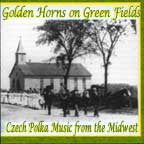
|
|
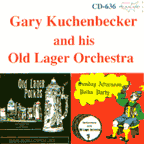
|
|
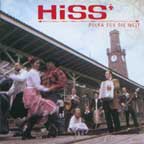
|
|
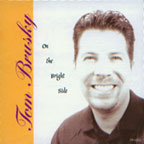
|
|
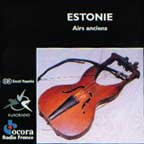
|
|
A
- American Polka
- (Various artists, Trikont US-289) My number one favorite polka album. A truly amazing compilation, it will give you a taste of a number of polka styles including Chicago Honky, Wisconsin Dutchman, Avant Garde, Mexican Conjunto, and Nuclear Polka. Every track is to be savored and the liner notes are the best. This is the compilation I would have programmed if they hadn't thought of it first. A+ [Read Steve Terrell's review]
- Out Behind the Barn
- (The What Cha Callums, self-published [no number], recorded January 2006, released May 2006) I love this CD! I bought it after hearing "Please Maria Don't You Cry" (a cover of the 1968 Bert Kaempfert "Sweet Maria") on www.WRJQradio.com. What makes that song so special -- along with much of the rest of the album -- are the enchanting triple-tracked vocals by Marilyn Lange. Thanks to excellent production and engineering she sounds a bit like the McGuire Sisters. Back that up with a sharp 8-piece oom-pah band and they achieve a sound unlike any other polka band I know of. A [9-17-06] [Purchased from Arvin & Marilyn Lange, 10718 Rangeline Rd., Auburndale WI 54412]
- Dick Rodgers and his T.V. Recording Orchestra CD-630
- (Dick Rodgers and his T.V. Recording Orchestra, Polkaland CD-630, original LPs released 1968 and 1970) A fine Wisconsin Bohemian album from Dick Rodgers, who started the band in 1945, when he was still in high school, and led it through 1975. The songs are interesting and peppy, the 8-man band plays with skill and gusto, the arrangements are top-notch, and the stereo separation is crisp. While a more modern recording would have a fatter bass sound, the transfer to CD is very clean (Did they have access to the original tapes?). I love almost every tune, but two stand above the others: "Stop Inn Saturday Night" is a fine tribute to the polka bands that were their contemporaries, such as the Six Fats, Lawrence Duchow, Alvin Styczynski, and Don Schlies; and the "Polish Falcon Polka" totally swings. Note that five other Dick Rodgers CDs have the same title as this one -- you have to tell them apart by their album numbers! No liner notes. A [7-24-06] [Vendor: www.polkamart.com]
- A Musical Journey to Poland
- (Various artists, WeltWunder Records 501-2, released 1999) Young musicians from Poland explore, reinterpret, and deconstruct their musical heritage. Whether you call it neo-folk, world music, or roots music, it's breathtaking and beautiful. Grzegorz Ciechowski's great remix of traditional Polish folk singing with dance grooves reminds me of Deep Forest. "Dorokina" is a fiery take on Polish Roma (gypsy) music. Jamaican and Polish singers collaborate on the poignant "Joint Zelene," singing in both English and Polish. Kroke is a classically trained trio from Kraków who are part of a revival of Jewish music from Poland. They play a sher ("scissors dance"), which is a kind of Jewish square dance. If you know Chudoba (and you should, if you've been paying attention to my reviews), they're also represented here. Liner notes are thorough and in English. This CD is hot, hot, hot! A [6-3-06] [Vendor: www.cdbaby.com]
- Puntas de Arerunguá
- (Los Gauchos de Roldán, Ocho Bajos Music, UPC 7-07541-78332-3, released 2005) Hot polkas from Uruguay, played on button accordion by Walter Roldán accompanied by guitar, violin, electric bass and percussion. Sounds a bit like Vallenato (an afro-caribbean style from Colombia) or cumbia. I imagine that the Buena Vista Social Club would sound like this if they were playing polkas. A [1-28-06; revised 1-29-06] [Vendor: www.cdbaby.com]
- global.kryner
- (Global.Kryner, BMG 82876-60632-2) Global.Kryner presents 13 familiar tunes, ranging from "Stardust" to "Like a Virgin," all flawlessly performed in the oompa brass oberkrainer style. These six brilliant musicians from Austria have been hugely popular in Germany, playing a style that originated in Slovenia. Lyrics are in English; the lovely booklet is in German. CD was released in 2004. It's not polka, but you should buy it anyway. A [10-5-05. Revised 4-24-06] [Vendor: www.abella.com]
- Big Band Polka Swing
- (Walt Procanyn Orchestra, Eastwind 43) I didn't much like the previous Procancyn CD I reviewed, but I love this one. This one was arranged, orchestrated and conducted by IPA Hall-of-Famer Henry Will (Wilczynski), who also wrote half the songs. The sound is lush and extravagant (I'd call it "swing band on steroids") and features the smooth vocal stylings of The Golden Voices of the Walt Procanyn Orchestra. You'll hear polkas, straight big band, and Dixieland, all performed to perfection by a group of nameless musicians (except the drummer, who's credited). Walt contributes his usual excellent graphic design. A [10-4-05] [Vendor: www.jimmykpolkas.com]
- Champagne Galop: Polkas, Mazurkas and Waltzes of Hans Christian Lumbye
- (Danish National Radio Symphony Orchestra conducted by Gennady Rozhdestvensky, Chandos Records, CHAN 9209) Danish composer Hans Christian Lumbye patterned himself after Johann Strauss I, eventually becoming known as "The Strauss of the North." Lumbye's work is exciting and has an oomphy, almost Sousa-like, quality. Best classical polka CD I've heard so far. Real liner notes. A [9-10-05]
- Rock 'n' Polka
- (Jimmy Sturr and His Orchestra, Rounder 82161-6109-2) Polka versions of rock 'n' roll hits from the late 50s and early 60s, like "Splish Splash," "Personality," "The Wanderer," and "Hello Mary Lou," featuring guest artists such as Lee Greenwood, Duane Eddy and Willie Nelson. Alison Krauss's hauntingly beautiful vocal on "Dream Lover" transforms the old Bobby Darin tune into a touching love song. Usually I find Jimmy Sturr too bland for my taste, but I find myself dancing in my chair when this CD is playing. A [9-11-05]
- Polkas, Lullabies & Wedding Songs
- (Chudoba, WeltWunder 202-2) I love the full, rich neo-traditional folk sound of this CD. It's very listenable and often downright beautiful; the recording is excellent, and the performances sparkle. Chudoba (meaning "meager possessions" in Polish) was founded in the early 90s by students at the University of Wrocław. They specialize in folk tunes from Galicia and neighboring areas, reinterpreting them with an array of acoustic instruments that include Jew's harp, mandolin, guitar, violin, dulcimer and flute. Good liner notes in English. Buy this CD! A [9-10-05] [Vendor: CD Roots www.cdroots.com] [Read the review at rootsworld.com.]
- Denkste!
- (Polkaholix, HeiDeck HD20032) They call their music Berlin-Speed-Polka. I call it non-stop fun from an amazingly eclectic band. Their music ranges from soca to bluegrass (in the same song!), from . . . words fail me. I'll just say that they're totally amazing. I had hoped that I was the first one to discover them, but Wild Wilson and Dandy Don Hedeker beat me to it. Liner notes in both English and German. A [9-11-05] [Vendor: www.rootsmailmusic.com]
- Brizgaaaaj!
- (Atomik Harmonik, Menart Records 383102381842-9) Atomik Harmonik is a quartet from Slovenia (really) with a kind of Eurodance/Alpenrock sound. If Frank Farian had taught ABBA to play polkas they might have sounded like this. Check the website for cool videos featuring the bodacious charms of Špela Kleinlercher and Špela Grošelj. The CD booklet has lavish graphics and extensive notes (in Slovenian). It ain't all polkas but it's a gas. A [8-1-05. Thanks to Greg Brown for giving me the heads-up about this fun group.] [On RootsWorld, Eric Iverson calls them "Slovenian Turbo Folk."]
- Real Hot Polkas
- (Happy Louie & Julcia Orchestra, HA-LO Records SHL-5010) Happy Louie defies description. His "Clarinet Polka" is straight Eastern-style; "Where's Johnny?" and "Mountain Polka" are Honky; and "Peanuts" (derived from Luis Guerrero's "La Cacahuata") has a nice Mexican flavor. The CD runs only 34 minutes, but Louie -- like L'il Wally -- has a wonderful polka voice and a warmth that makes you feel like you've been invited to a party. [Rated " B" on 9-28-04. Raised to "A" on 5-5-05: Sure, there are no liner notes and it sounds like the vocals were recorded in a wash tub, but the album is so cheerful that I keep listening to it over and over.]
- Wow!
- (Don Cialkoszewski "The Polish Kid," [no record company or number] Don is "Mr. Excitement" in my book. Sure there's a bit too much synthesizer and the vocals are uneven, but this CD puts a smile on my face every time. The songs range from bright-sounding Slovenian to sweet Czech, with Polish and German rounding out the mix. A [1-7-05]
- The Haunted House of Polka
- (The Shanes, Pinorrekk Records PRCD-3405033) Brilliant alternative polka CD. One website called them "German folk-punk with polka and gypsy stylings." They've also been described as "polka-thrash" or "Hard polka." In any event, you'll hear allusions to Arthur Brown, Rednex, Those Darn Accordions, the Doors, Enigma, Love, and much more, but the final product is pure Shanes and it's a feast for the ears. There's a nuclear polka version of Piaf's "Padam Padam." There's even a tango that's . . . indescribable. Good booklet, too. A [9-28-04. Revised 10-4-04. Revised 10-11-04.]
- Dutch Hop -- Music of the Germans from Russia
- ("Performed by Adolph Lesser and his Polka Band and Paul Weingardt and his Polka Band," produced by Kurt E. Goldenstein) Goldenstein has given us a generous 73 minutes of music collected from old records. All the music is "Dutch Hop," i.e., in the traditional style of the Germans who emigrated to Russia in the 18th century and then to several states in the American west in the late 19th century -- most notably Colorado. The arrangements cover a pretty wide range from big band to hoedown, but it all has an appealing lilt. Some even reminds me of Scandinavian polkas. Because of the age of the recordings, the sound quality is not so good, with the result that the hammered dulcimer -- characteristic of the Dutch Hop -- can be hard to distinguish. On some songs, the accordion player does an amazing imitation of a violin. Considering the care that the producer lavished on this project, the liner notes are surprisingly poor. However, the $30 price tag is more than justified by the 294 page book that accompanies the CD (see below). A [6-29-04]
- Walt Wagner and the Polka Serenaders Orchestra Present Giant Polkas Featuring Music of the Great Bands of the Connecticut Valley
- (Walt Wagner and the Polka Serenaders Orchestra, Mojo Polka Records WJW-04) Some say that Wagner is an anachronism, a throwback to the sound of earlier polka bands. I say that that's his charm. Finally I can hear what those Eastern-style bands must have sounded like their heyday. Not only is the sound quality good, but the arrangements are rich and varied, and show off the breadth of Wagner's band. They can sound like Witkowski or Sturr or a straight big band. I particularly like Walt's singing on the minor key "In the Pines Polka." The album's concept is to cover songs by the prominent Connecticut Valley bands of the 1950's. I only wish the notes had made clear which song is associated with which of those bands. Otherwise, the notes are ok, crediting the musicians and songwriters. The excellent album art is uncredited, probably produced by some nameless drudge at Disk Makers. Twenty songs, 72 minutes. Best Eastern-style polka CD I've heard so far. A [5-19-04; revised 6-29-04]
- The Best of Flaco Jiménez
- (Flaco Jiménez, Arhoolie CD-478) A sweet and bouncy conjunto collection. Flaco joins in duets with a variety of singers and plays button accordion throughout. He's particularly effective when teamed with Toby Torres on "Cuando Mas Tranquila" and "Un Viejo Amor." Ry Cooder makes an appearance, playing slide guitar, and Hugo Gonzales' rich and expressive voice gets a solo turn. Of sixteen tracks, one is a polka instrumental and seven are rancheras sung to a polka beat. Compiled from five other Arhoolie CDs of varying vintage so the sound quality is uneven but it's a lot of fun anyway. [3-9-04 B; raised to an A on 3-21-04 -- it's the best conjunto CD I've heard so far]
- Blechschaden
- (Blech and Brass Banda, SMT Records SMT-007) BBB, an Austrian brass contingent consisting of thirteen horns, one drummer, two singers and an audio engineer, has produced one of the finest polka albums I've heard. They have a brilliant yet sweet tone. Their arrangements are of symphonic quality, employing more counterpoint than one usually expects from a polka band, and totally devoid of schmaltz. The tunes are mostly Polish, but there is one outstanding doo-wop number. There is plenty of variety, including two songs with vocals. The drumming is excellent -- listen for where Reinhard Hoffman doesn't play. There is a bit too much echo for my taste and the limited liner notes are in German. A [3-2-04]
- Waila GP Style (Group Papago 2001, Rock-A-Bye Records RABR-00028), Chicken Scratch (Warrior, Rock-A-Bye Records RABR-00013), and New To Your Ears (Warrior, Rock-A-Bye Records [no number])
- If Lawrence Welk played "Champagne Music," this is Kentucky moonshine. At first I hated all three albums. They're loud and irritating like a drunken party when you're trying to get some sleep. But I didn't want to give up on Waila (Native American polka) without giving it a chance, so I kept playing the CDs. I began to notice a real tunefulness under the noise. Then I noticed that there were some songs that had a sensuous and sinuous quality like a shot of good Stax-Volt R&B. It turns out that those are the cumbias -- not the sweet cumbias of Mexico or Columbia, but cumbias that smack you upside the head. There are also polkas, played with all the energy and finesse of a good garage band. The rest of the repertoire consists of chotes (
- Fiolin Min -- My Violin: A Scandinavian Musical Journey
- (Jonita Aadland, Accent Productions AP02-1) Aadland is great. She plays polkas, waltzes, reinlanders and a couple marches, all with verve and skill. Jerry Bravo and Butch Kresovich accompany her with admirable subtlety. But don't be fooled by the snow-covered mountains on the CD cover -- this Norwegian fiddler lives and works in Florida. A [11-3-03; revised 11-18-03]
- Hardcore 2/4
- (Polkacide, Dog Patch Records DOG005) Combine the Dixieland sound of the Squirrel Nut Zippers with klezmer by the Jews Brothers Band and humor from Walt Solek. Add a pinch of raunch from the Fugs, and what would you get? I have no idea. But that's the only way I can think of to describe the manic, sometimes vulgar, good-time music of Polkacide. Buy this album. A [10-19-03]
- Polka Record
- (LynnMarie [Rink], Squeeze Records / Rink Entertainment RE-Q0451) Outstanding! LynnMarie markets herself as a mainstream artist, but this is the best "alternative" polka album I've heard yet. Her "Cleveland, the Polka Town" is amazing. She brings new life to the hoary old "Beer Barrel Polka." Then there's "Never Ending Song of Love," which ranges from traditional polka to Western to Cher-like dance -- all seamlessly woven together. And the list goes on. LynnMarie and Charlie Kelley, her outstanding arranger, have done a dynamite job. A [8-30-03; revised 9-25-03]
- KNUJ 50th Anniversary Collection
- (Various artists, KNUJ-Radio One [no number]) Forty three songs from New Ulm's premier polka radio station. The sound quality is a bit weak in places, but almost every song is a gem. I loved "Oh, Loretta," a schottische by the Leon Olsen Band, Bruce Bradley's wonderfully square "Happy Wanderer Polka," the Wendingers' "How Married Are You, Mary Ann?," the fiddling on "Maple Sugar Polka" by the Marv Nissel Band (not the only song here with a touch of country), the tuba solo on Ivan Kahle's "Cradle Polka" and much, much more. No liner notes (what a shame!), but this is still an all-you-can-eat buffet for Dutchman fans. A [8-3-03]
- The Time-Life Treasury of Polka
- (Various artists, Time Life Music R142-06) Excellent compilation, if a bit on the square side. Almost every song is a gem: Myron Floren's "Laughing Polka," the Andrews Sisters' "Beer Barrel Polka," Jimmy Dorsey's "Helena Polka," and the list goes on. Little Joe Hernandez' sings part of "Just Because" in Spanish. Even Lawrence Welk is represented, and he sounds great. Carl Finch helped make the selections. The sound quality is good, even the stereo is mostly good. Packaging is attractive but the liner notes don't list the musicians. Just 80 minutes of music is spread across two CD's (ugh!). In spite of its faults, it's a must-have. A [6-16-03]
- Ach Ja!!
- (Becky & The Ivanhoe Dutchmen, Becky-05) This is one of the most enjoyable albums I've listened to in a long time, an attractive blend of traditional Dutchman instrumentation with a delightfully varied repertoire. Becky Livermore has a great voice and there is some terrific harmony singing here -- even a bit of yodeling! The arrangements are understated but excellent. The packaging is nice and the liner notes list the band members. Too bad that the songwriters are uncredited (e.g., the beautiful "When the Snow Is on the Roses." is by German composer Hans "James" Last, a former jazz bassist and one of the most successful "easy listening" bandleaders of all time). Quite a few slow songs, but I love it anyway. A [Revised 6-29-03, 11-18-03]
- Call It What You Want
- (die Schlauberger, Wise Guy RP-103-100) It's hip, it's German and it rocks -- think Brave Combo in lederhosen. Die Schlauberger plays some polka, some Alpine, some bubblegum and some reggae, and they do it all well. They even invited Didier Rachou to add his guitar to "Gitarrenmückl" (just as Steely Dan brought in Elliot Randall to play on "Reeling In The Years"). This CD is so good that I barely noticed that the lyrics are nearly all in German. You might think, "These guys should be opening for the Rolling Stones in Meadowlands Stadium." But I don't think the Stones would want to follow die Schlauberger on stage. Buy it, it's an "A." [revised 3-31-03, 6-29-03, 2-22-04]
- Texas Polish Roots
- (Brian Marshall & His Tex-Slavic Playboys, Arhoolie CD-464) Ten tons of fun! Twenty-two mostly Polish polkas and waltzes, though one of my favorite tunes is the Czech-style "Moravia Polka" by Mark Halata. The album has a strong Texas Country-and-Western flavor (maybe that's true Tatra mountain fiddling in there, but it sure sounds like a square dance to me). I like it all, even the booklet. Thanks go to my brother-in-law, without whom I would have missed this band entirely, since they're usually booked as a "folk" act rather than as a polka band. A [2/27/03]
- Grandpa's List: The Best of the Dujka Brothers, Vol. 2
- (Dujka Brothers, self-published 2001) They certainly give you your money's worth: 22 songs ranging from Czech polkas to " Allá en el Rancho Grande;"from "Roll Out the Barrel" to the cowboy sound of "Strawberries, Raspberries Polka." The liner notes are adequate and make it clear that John and Mark Dujka played all the instruments (not everyone else is so candid). While the Dujka Brothers are considered a Texas-Czech act, much of the album sounds Slovenian to me, with two accordions in front and bass guitar carrying the bottom. Nevertheless, the infectious cheerfulness and quality of the arrangements, as well as the album's length and variety earn it an "A."
-
>On a later listening: These guys
really know how to put together a set, varying songs between different
styles, tempi and languages.
>8-9-05: It still holds up. The vocals are perfect and the arrangements sparkle. - Frank Yankovic and His Yanks
- (Frank Yankovic and His Yanks, Soundies SCD 4106) These forty-one tracks from 1950 have a more informal feel than the other Yankovic album listed here, which makes it much more appealing. The songs range from typical polkas to a tarantella ("Butcher Boy"), from a bit of cocktail jazz to "Come Back to Sorrento." There's even a touch of kazoo. The sound is a bit weak in the treble, most likely because of the need for noise reduction in transcribing from the early recordings. The slim booklet is unusually good, listing sidemen (with pictures!), songs, composers, track length and a brief history of the band. A
- (International) Golden Hits
-
(Li'l Wally Jagiello, Jay Jay 5019) No liner notes, too many waltzes, and
only 12 songs altogether. The album could have benefited from a competent
producer, but the producer would probably have made Wally sound like Frankie
Yankovic so what's the point? I say: kick back, enjoy Wally's incomparable
sincerity and the occasional snatches of inspired improvisation by the
uncredited sidemen.
>I was somewhat disappointed when I first heard this album. I don't know what I was hoping for -- Polkacide? But I keep coming back for more Li'l Wally. It's like Mickey Katz meets Preservation Hall Jazz Band with a dash of Ferko String Band thrown in. I'm raising my rating to an A. - Irresistible You
- (Lenny Golmulka and Chicago Push, Push Records CPE-9502) I keep coming back to this charming CD. While it has some of the studio sound that plagues Miskulin's Country Polkatime album, it fares better due to Gomulka's songwriting ability and great voice, as well as the interesting arrangements. Also, listen for some hints of rock and roll in the drumming. A [rev. 3/20/03]
- Squeeze This!
- (Those Darn Accordions!, Flying Fish FF-70627) They're not a polka band but this album is outstanding anyway and contains a couple polkas. A
- Deeper Polka
-
(Various artists, Smithsonian Folkways CD-40140) Like "Deep
Polka," a compilation of Midwestern polka from a variety of ethnic
backgrounds -- but this CD is more diverse. I found the "Logger's
Schottische" by Al Reko and Oren Tikkanen particularly charming.
Extensive notes and the packaging is very good, too. A
>Later listening note: The more I hear Reko and Tikkanen, the more I like them, and the more I think they're crypto-klezmorim.
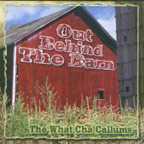
|
|
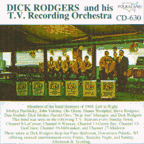
|
|
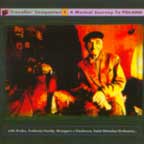
|
|
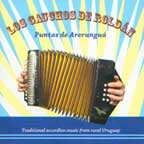
|
|

|
|
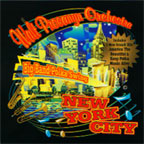
|
|
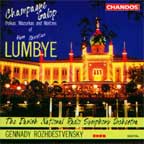 |
|
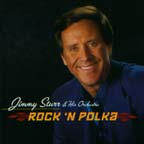 |
|
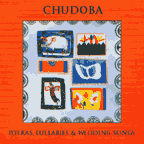 |
|
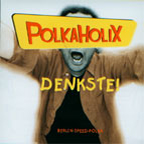 |
|
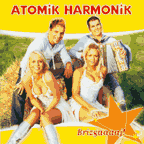 |
|
B
- Tuba Dan Family Band
- (Tuba Dan Family Band, Reel to Reel Records [the one in Oshkosh WI] 01537, released 2005) Thanks to Aaron Schuelke's WRJQ radio, I've been listening to lots of cool Dutchmen (German) and Bohemian (Czech) polkas these days. One of my happy discoveries has been this CD from the Tuba Dan Family Band, a Czech outfit from south-central Wisconsin. Dan's previous band, the Polkalanders, recorded from at least 1985 to 1990 and was probably active longer than that. He's now recording with sons David and Dan Jr. (of Copper Box fame), and daughter Lila. They play a nice boppy version of the "Our Mike Polka," a tune that goes back at least to 1934 when it was recorded by the Viking Accordion Band; there's a sweet cover of the old McGuire Sisters hit "Sugartime"; "Blue Moon Turns to Gold Again" is solid Wisconsin Dixieland; and thanks to careful overdubbing, the band achieves a nice mass brass sound on the "Go To Sleep My Children Waltz." Liner notes are thin and songwriters are not credited. Altogether, a lot of fun. B+ [5-13-06] [Purchased from Tuba Dan Jerabek, W 12539 Olden Rd., Ripon WI 54971]
- Polkas and More, Volume 1
- (The Don Lipovac Orchestra, [self published, no number], [no date]) I heard Don Lipovac's version of "Perle de Cristal" (a French musette tune from 1936) on the Polka Jammer Network and then tracked down this CD. It was worth the effort. The music covers the kind of range rarely attempted by today's bands: Slovenian, Polish, Latin, Greek, Austrian, French, and Dalmatian (Dalmatia is mostly in modern Croatia). For simplicity's sake, you could call the band's sound Slovenian -- both because of Don's heritage and because Don's award-winning accordion playing is featured on most of the songs. Standout tracks include "Suze Liju Plave Oci" ("Blue Eyes Crying in the Rain") and "Topkapi Waltz." Twenty-three tunes in all, taken from two albums probably recorded in the late 1970s or early 80s, Polka Feast and Playing Your Requests. The sound quality and stereo are good, but there is no booklet -- not even a cover -- just a tray liner listing the tracks. Square but yummy. B+ [1-15-06] [Vendor: www.polkas.org]
- Family Tree
- ("Pan" Franek [Piotrowski] & Zosia [Piotrowski] & The Polka Towners, [self-published]) It's not "Honky," it's not "Push," it's not your usual Polish band. This family outfit from Michigan features prominent violins, which gives them a sound more like folk-rock than anything else. The vocals (English and Polish) are good, the packaging is beautiful and the booklet is informative. Their "Polka Hoedown in II" (based on Cotton-Eyed Joe) is a killer. B+ [12-29-05] [Vendor: www.jimmykpolkas.com]
- Good Times Never End
- (Pat Zoromski and the Boys from Polonia, Redbird RBR-0403054 135503.04) By the late 1950s, the Poles of the upper Midwest had embraced the German and Czech styles of artists such as "Whoopee John" Wilfahrt and Romy Gosz. Then Honky evangelist L'il Wally Jagiello began touring the area and caused a revival of interest in Polish polka music. Today, Pat and the Boys keep Midwestern Honky alive, playing mostly familiar tunes with delightful gusto, though the highlight of this CD is their polka version of Albert Von Tilzer's 1910 "Put Your Arms Around Me Honey." Top-notch fun. B+ [5-25-05]
- Feiern ist ein Hammer
- (AlpenRebellen, Koch 324-636) Peppy poppy Austrian rock, perfectly performed and produced; Jerry Kasenetz and Jeffrey Katz would be proud. I first heard "A bisserl Woodstock," a takeoff on "Hey Joe," on 247polkaheaven but it took a few months to track it to this CD. Elaborate liner notes. Few polkas but plenty of happy listening here. B+ [Rated "B" on 5-25-05. Raised to "B+" on 8-1-05.] [See what Kevin, drummer for dSb (die Schlauberger) has to say.]
- Dancing in the Dust: The Waila Festival Live!
- (Various artists, Blue Bhikku Records BB-00014) In the Keil book, David Paul Winkler is quoted as saying, "I can't get enough if that 'old style,' old village styles like gorale fiddling, the minor keys, something barbaric about it. That's why I go for Chicago-style polkas; they still have some of that mountain music sound." I think old D.P. would love this CD. No prettified Jimmy Sturr orchestra here, just the rugged sounds of five Waila bands of the kind that play at all-night dances on the Tohono O'odham reservation. Mostly recorded live at the 1997 Waila Festival in Tucson, Arizona. Good sound quality and real liner notes. B+ [10-8-04. Revised 10-10-04. Rated on 11-6-04]
- Versalicious
- (Eddie Blazonczyk's Versatones, Bel-Aire Recordings BACD-4637) On this CD, the Versatones -- probably the most influential polka band working today -- perform songs from an amazing range of sources. I particularly liked "Jessico" (from the Kentucky Headhunters), "She's Going Up" (from Canadian Celtic-rock band Great Big Sea), and "Take My Hand" (from Louisiana's Deuce of Hearts). Other songs come from Irish songwriter Pete St. John, Barenaked Ladies, Larry Trojak, Frank Wojnarowski -- and the list goes on. Most of the singing is quite nice, though the notes don't say who sang lead on which song. Overall, I'd say that the band's sound and choice of repertoire is similar to the Polka Country Musicians. B+ [Rated B on 8-19-04; raised to B+ on 8-25-04]
- Jammin' Polkas
- (Steve Meisner Band, [self-published] HG-5045) Steve's got that bright Slovenian sound, like the hot glint of the sun bouncing off a chrome bumper in the middle of August. He's got a great polka voice and the lyrics are even in English. "Blue Island," written with Bob Kreiser, is an impressive original -- I think it's a polka-bolero. And the last cut, Steve's version of the Buck Owens "Where Did the Good Times Go?" is a real showstopper. I like the fact that the vocal harmonies are real, not synthesized. I like the use of sax and flute. I even like Steve's bass playing. The production and engineering are good, as was the CD conversion (the album was originally recorded in 1988). Liner notes credit the songwriters and musicians. Only 35 minutes. B+ [5-3-04; revised 7-4-04]
- Highways are Happy Ways
- (Peter & Paul Wendinger Band, P&P-97) Dutchman music with a sweeter sound than you find in the Brueggen bands. For rhythm, they use a piano plus high-hat in place of a banjo; there's sweet three-part harmony singing, and you'll also hear clarinet and sax. Doug Young's tuba playing is outstanding -- perhaps I noticed because it is so prominent in the mix. Since the band's two leaders both play concertina, I expected some scorching interplay between them, but it wasn't evident. "Highways are Happy Ways" is absolutely wonderful. "Sweet Nearness of You" is not up to the quality of the rest of the album. The liner notes are ok, but it would have been nice if they had mentioned that Abe Lyman composed the melody on which the "Mary Lou Polka" is based. B+ [Rated B on 4-10-03. 4-29-03: On a later listen, I think the album's great. I'm upping it to a B+.]
- Here Come the Polka Heroes - Vol. 1
- (Various artists, Our Heritage . . . Pass It On [Cleveland International] HER-2001) Super Slovenian-style sampler. Also includes a smattering of other styles, such as a few "Push" tunes, a cut by Brave Combo, and Johnny Krizancic's tamburitza version of "Long Live our Brothers, Long Live our Sisters." Twenty nine songs in all, running a generous 73 minutes. I like Jerry Suhar's Jimmy Durante imitation on "Good Old Fashioned Wife" as well as the singing of Christine Hibbs and Lynn Marie Rink. The liner notes are passable. B+ [3-20-03]
- Shades of the Jodie Mikula Orchestra
-
(Jodie Mikula Orchestra, self-published 2001) Good, solid Texas Czech
music. Mostly polkas, a few waltzes, a bit of country, even "El Rancho
Grande." Mostly instrumentals, with a pair of very expressive trumpets
carrying the lead. Where most self-produced albums are amateurish, this one is well
engineered, mixed and mastered. The liner notes (including a band list!) are
offset printed not output on a home computer. My only complaint is the
limited dynamic range of the album -- everything is pretty much bouncy
mid-tempo fare. I would have found it more satisfying if they had included,
say, a quiet lullaby and a rave-up. That being said, it's a tasty album. B
>Even the design of the CD imprinting was done with care. I'm raising my rating to a B+
>3-8-03: The "Schneider" polka picks up a tiny bit of Honky-type swing towards the end -- very nice. - Early Years
- ([Leroy Larson and] The Minnesota Scandinavian Ensemble, Banjar Records BR-2530CD) The first Scandinavian fiddle I heard was on a cassette my wife brought back from Minnesota called Scandinavian Fiddle Vol. 1 by the late Craig Ruble. I loved his sweet tone and the tunefulness of his repertoire. Later, when I got into polkas, I enjoyed Al Reko and Oren Tikkanen as well as the Goose Island Ramblers from Rick March's excellent Deeper Polka compilation. This summer, my wife brought brought back another recording from Minnesota: this time it was the Minnesota Scandinavian Ensemble's Early Years CD. It has the same melodious lilt that I hear in other music of the genre. Only later did I learn that Craig Ruble had played with the Ensemble (though not on this recording). Fifty-three minutes of pleasure. B [10-12-03. Raised to a B+ on 2-17-05.]
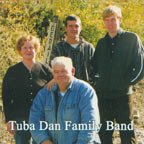
|
|
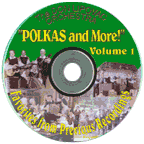
|
|
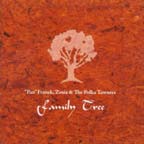
|
|
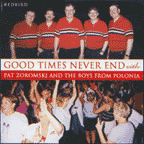 |
|
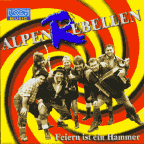 |
|
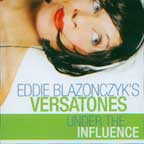
|
|
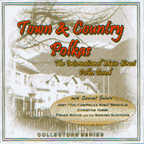
|
|

|
|
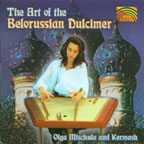
|
|
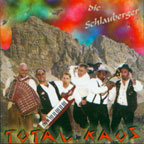
|
|
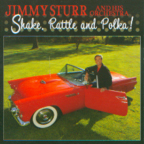
|
|
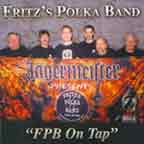
|
|
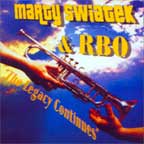
|
|
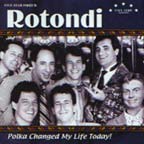
|
|
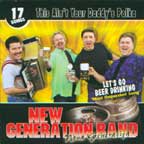 |
|
 |
|
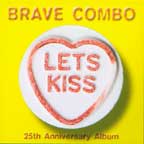
|
|
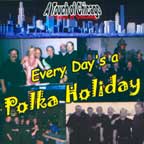 |
|
- Room for Change
- (Change of Pace, Change 2655) A solid "Push" band working a vein similar to Crusade's. Standout tracks are Michael Tylinski's "Higher Power" and the "Changed Drinking Song" from The Sound of Music. Good vocals, too. B [3-11-05]
- Music from Sliabh Luachra
- (Jackie Daly, Green Linnet GLCD-3065) When I asked Dave Mallinson to recommend some Irish polkas, he warned me that they would be "quite different" from the type listed on this site. He was right, of course, but I'm glad I went ahead anyway. Jackie Daly, a well-known folk musician, plays solo accordion on a range of tunes including several polkas which are typical of the Sliabh Luachra region. It ain't "Kick Ass" but I like it. B [1-7-05]
- Polkas United
- (Walter Ostanek and Gaylord Klancnik, Ranch Recordings DSF0034) You'd think that presenting two polka bands on alternating cuts of a CD, recorded in seven studios by an army of musicians would be a recipe for disaster, but Ed Klancnik and the redoubtable Gary Rhamy have pulled it off. I particularly liked Christine Hibbs' vocals (no surprise, there) and Norm Kobal's baritone sax. A solid Slovenian-style CD. B [11-12-04. See the supplementary notes provided by Ed Klancnik.]
- Dogs Playing Polka
- (Big Lou's Polka Casserole, Accordion Princess Records, UPC 8-07207-02862-8) With cover art that pokes fun at the classic Cassius Marcellus Coolidge painting, what's not to love? There's a sparkling version of Flaco Jiménez's "El Guero Polkas," I enjoyed the "Cry of the Wild Goose" (though I can't get Mickey Katz's parody out of my head), and "Indifference" is a real charmer in the bal musette style of 1930s Paris. There's plenty of other excellent stuff. All in all, this CD strikes me as having more variety and fun than the Polka Casserole CD I review elsewhere; I just wish it had better liner notes. B [9-28-04. 10-4-04: Listen for several smokin' solos by pedal steel virtuoso David Phillips. Yowza! 10-10-04: revised. 11-12-04: revised.]
- In Response to Exile
- (Crusade, Runner Records EBC-9906) Eddie Biegaj and Crusade are traditionalists who are pushing the polka boundaries into pop and rock. On "Dream," the sound ranges from zydeco to rock 'n' roll. "Doo Wop" combines rock 'n' roll with Push-style horn work. Also notable is Randy Krajewski's charming original, "Alyno," and Eddie's powerful and moving singing on "In the Grove." I even enjoyed the uberschmaltz of "The Last Waltz." Comes with a luxurious booklet. B [9-28-04. Revised 10-10-04.] [4-27-05: I frequently hear Crusade on the Polka Jammer Network and almost always enjoy what I hear.]
- The Best of Steljo: Volume One
- (Various artists, Steljo Records 738) A compilation of older Chicago- and Eastern-style polkas, mostly from the 1970s. I particularly enjoyed "We Share Polka Music" by Dick Pillar, "Ballroom Polka" by Ray Henry, and Lenny Gomulka's "Polka Rockin' Weekend" (Lenny was in great voice as usual), but those aren't the only gems on the album. The liner notes are surprisingly thin -- producer Dick Pillar must know a million stories about the bands he included here, but he neglects to share them with us. At least the songwriters and timings are listed. The sound is mediocre in spite of Pillar's access to the original masters, but there's enough good music to merit a "B." [8-26-04]
- 3rd Generation
- (Various artists, produced by Ed Klancnik and Eric Noltkamper DFS-0017, UPC 6-3965500172-0) Fifteen instrumentalists, 7 vocalists, 5 recording studios in 3 different states -- the producers have attempted to assemble an all-star band composed of younger-generation musicians. Names I recognized included Eric Noltkamper, Mike Grkman and Tom Brusky. The effort is mostly successful. I particularly enjoyed "Little Eddie's Dutch Hop," featuring John Stehle Jr's sparkling hammered dulcimer. I also think they did a great job on the "Wind Song," a beautiful waltz by Slovenian greats Slavko and Vilko Avsenik. The liner notes are surprisingly poor: they don't say who played on which cut or who engineered. Even the Avseniks' name is misspelled. In spite of a couple weak songs, I'd say it's a solid Slovenian album. B [7-4-04]
- Polka Comes to Your Haus
-
(Various artists, Restless Records 7-72352-2) An audio snapshot of
alternative polka, circa 1990. Rotondi's "Blue Polka" is
outstanding and Brave Combo's "Do Something Different" is
first-rate. Many other fine selections from artists such as The
Wallets, The Romaniacs, Das Fürlines (fronted by the late lamented Wendy
Wild) and others. The three Polkacide cuts, recorded live in 1986, are not
up to the quality of the rest of the album. B [3-30-04]
> I really like this CD, except for the last three tracks, which bum me out. [5-3-04] - > Check out the smokin' bass playing of Jim Clifford on the Wallets' "Big City Polka."
- The Ridgeland Dutchmen & Wisconsin's Concertina Kid Present . . . "Cashton Our Polka Town"
- (Gary W. Brueggen and the Ridgeland Dutchmen, [self-published, no number]) Gary is descended from a long line of Wisconsin musicians that stretches back well over a hundred years (see his website devoted to the Dutchmen-style bands of western Wisconsin). This CD has over an hour of solid Dutchman music, played by a four-piece combo. Gary's concertina playing is fluid and his voice is quite pleasant, though with a limited range. I like the fact that several foxtrots have been added to the usual mix of waltzes and polkas; there's even Gary's version of "Everybody's Somebody's Fool." Richie Yurkovich has done an outstanding engineering job in creating the illusion that each song was recorded in a single take -- if you could get perfect miking and mixing in one take. B [11-14-03; revised 11-18-03]
- The Boxhounds
- (Lynnmarie [Rink], Squeeze Records / Rink Entertainment RE-Q0462) Mostly, I shop around looking for different polka artists to sample, but after hearing Lynnmarie's Polka Record I had to buy another album of hers. Like Polka Record this CD features the amazing arrangements of Charlie Kelley (think Vanilla Fudge but more interesting). Particularly noteworthy are the new interpretations of "Just Because" and "That's Amore." Lynnmarie's "Norman" is nice but I think the Sue Thompson version still holds up well. B [10-19-03] [3-5-06: If you can find it, get the pressing (RE-Q0461) with "Pulled Chicken." It's like the "Chicken Dance" but with funked-up guitar and horns. Scrumptious!]
- Back With a Heart
- (Polka Country Musicians, self-published PCM-8413) I bought this from CD Baby (cdbaby.com), one of the great online music retailers. Wally Dombrowski's band has a bright upbeat sound, anchored by John Pilch Jr.'s energetic drumming. Effortlessly combines country-rock with push-style polkas. B [10-11-03]
- Polka Casserole
- (Big Lou [The Accordion Princess], Our Heritage . . . pass it on HER-2009) There's no denying the importance of Big Lou the Accordion Princess in the Nuevo-Polka movement but Polka Casserole is just not as good as Squeeze This!, her album with Those Darn Accordions. "They Call the Wind Mariah" as a polka is nice and I was glad to see Big Lou revive John D. Loudermilk's "Norman" (a hit for Sue Thompson in 1961). This CD might have gotten a better rating if it had not arrived in the same mail as LynnMarie's Polka Record but that's life. [8-30-03] B
- World's Greatest Polka Band
-
(Bernie Witkowski, Stan-Dot Records [no number]) From what I've read, the
first American polkas that didn't sound like they were imported from the old
country were played by Eastern-style bands like Witkowski's. Little of that
genre is presently available on CD. Witkowski, one of the first six
inductees into the IPA Polka Hall of Fame, has only this one CD in print.
Its 17 songs, 12 of which are polkas, feature virtuoso performances (such as
Witkowski's own clarinet playing), often at breakneck speed. Particularly
interesting are the minor-key "Big Shot Oberek," the "Shave
and a Haircut Polka," which sounds like early Dyno to me, and the
"Good Luck Polka," which is actually the klezmer standard "Choson
Kale Mazel Tov." The bad news is that the sound quality is poor and
there are no liner notes. B [3-18-03]
>Great tunes, interesting arrangements, bad sound. With decent notes and good sound, this would have been an "A." [3-22-03]
>Read what Gene Mikrut and Ken Doyle have to say about Bernie Witkowski. Ray Gavlak weighs in. - South Texas Polka Party: 16 Polka Instrumentals
- (Various artists, Arhoolie CD-9005) An outstanding conjunto compilation taken from old Ideal and Fama records. The sound quality is unexpectedly good and the sixteen songs present a broad array of conjunto artists. The bad news: the liner notes say nothing about the artists who have been included. In other words, to learn about the conjunto genre, you'll want to buy this CD and then Google up your own research or read Keith Chandler's review. That said, the variety seems better than that of the Rounder conjunto compilation I review elsewhere. B [rev. 5-27-03]
- Daddy . . . Play Tina
- (Brian and the Mississippi Valley Dutchmen, self published 105698.5) More of that yummy Dutchman music from the Brueggen clan. This CD is somewhat better than the Karl and the Country Dutchmen CD I review elsewhere (hey, Karl's was recorded almost a quarter century ago, when he was just 18). Here, the sound is a bit brighter, perhaps because the horns are more prominent, and the arrangements are more interesting. The variety of songs (Dixieland, music hall, "Dutch" dialect, traditional, original, etc.) keeps the interest high. B [rev. 4/2/2003, 2/22/04]
- Karl and the Country Dutchmen
-
(Karl and the Country Dutchmen, self-published 1979) This just arrived from
the nice folks at KNUJ Radio. KNUJ sells cassettes and CDs from what seems
like every Midwest Dutchman band that ever recorded. Their website is
broken, so call 1-800-444-5685 to order.
This album is a bit unpolished -- not surprising when you realize that Karl recorded it in 1979 when he was only 18! That said, it is quite well done. Particularly appealing is his choice of songs, most of which I haven't heard elsewhere. B - Play Me a Polka -- Tex-Czech Polkas
-
(Various artists, Rounder CD-6029) The title track, by the Czech
Harvesters, features electric guitar, hammered dulcimer, tuba and saxophone
-- what's not to love? It's a great tune, not available elsewhere. The rest
of the album sounds a lot like Li'l Wally, except for the tuba carrying the
bass line on some of the songs. Bubba Hernandez of Brave Combo did a fine
job of selecting the songs for this compilation. On the other hand, the
liner
notes are barely passable. While the booklet contains pictures of the bands,
it doesn't provide
names of the band members, the instruments they played nor the dates of the recordings.
As a result, you can't tell whether the Joe Patek number is from an ancient
78 or just a bad recording. [See what Mark
Rubin has to say about this album.] B
>On a later listen, I think the selection of songs is outstanding. - Polka Passion
- (Various artists, GPN 203.092) Live album produced by the Nebraska educational television network. Five songs by Eddie Blazonczyk & the Versatones, four by Karl & the Country Dutchmen, and four by the Polka Family. Maybe I'm just falling in love with Dutchman style music, but I think the songs by Karl & the Country Dutchmen are the best on this album. The band can also be heard on the Deep Polka album and similar bands can be heard on the Deeper Polka and Play Me a Polka CDs. The Polka Family's "Fiddle Faddle Polka" is a nice country-tinged number and the Versatones get to rock out on "Ukrania," a standard that I hadn't heard before. Finally, the liner notes list the names of the band members, unusual for a polka CD. B
- Frankie Yankovic and His Yanks' Greatest Hits
- (Frankie Yankovic, Columbia CK-9287) Lots of hits, well played (of course). No liner notes. B
- Deep Polka
-
(Various artists, Smithsonian Folkways SFCD-40088) Contemporary midwest
polka including Karl and the Country Dutchmen plus Norwegian, Czech and
Finnish styles. Extensive liner notes and beautiful packaging. B
>"Bijeli slapovi" by Vatra is a delight. Sounds Greek to me. [3/9/03] - The Best of Polka
- (Various artists, Polka City Records 1072-2) Two CD set, plenty of hits by most of the names in the American polka veldt. Check out Peter & Paul Wendinger's Dutchman-style "Johnny's Knocking Polka." No liner notes. Shop around for the best price. B [rev. 3-31-03]
- Conjunto! -- Polkas de Oro -- Texas-Mexican Border Music Vol. 5
- (Various artists, Rounder CD-6051) Very nice collection of Tex Mex instrumental polkas, though I can't yet tell one from another. Good liner notes. B
- Once Upon A Polka . . .
- (Praha Bros., [self-published]) The Praha Bros. is a Texas-Czech band from the Temple area in Central Texas. Their new CD, Once Upon A Polka, features excellent horn and clarinet work and I liked their uptempo numbers. But the waltzes are all played in dirge tempo and the arrangements are uninspiring. I liked the packaging, though the liner notes do not credit the songwriters. [On 8-30-03 I gave this a " C." On 9-25-03, I said "They really ought to listen to how the Wendinger Brothers make their waltzes sound light and airy. Other than that, I enjoy the album and keep coming back to it." On 11-2-03, I'm raising this to a "B" because I find myself enjoying the album more. 1-4-04: And their Mexican stuff is great! 2-2-04: Ok, so I don't like Texas waltzes, but I really like the rest of this CD!]
- KCHK & KRDS Present Music From Czech Country
- (Various artists, Radio Southern Minnesota [no number]) Czech and Dutchman-style songs by some lesser known bands from southern Minnesota. Uneven but pleasant. [Rated C on 10-11-03. Raised to C+ on 1-4-04 because of a couple terrific songs such as the Ben Barta Band's "North South East West." Raised to B- on 2-2-04. On 2-17-06 it made it up to B.]
- Charmed and Dangerous
- (Charm City Sound, Westwood Music Group WECD-1160, released 2006) I came back to this CD after listening to Dutchmen and Bohemian polkas for a month, and was struck by how close to rock 'n' roll it sounds. Led by Mike Matousek since 1998, Charm City Sound is a very professional Push band out of Baltimore. I like their "Dance With Me," based on the Gipsy Kings' hit "Baila Me," here performed as a calypso (!); the heavy sound of "Got to Go" reminds me of Crusade; Mike Matousek's rich baritone beautifully complements "Someone Special," a rock 'n' roll ballad that you can polka to; "I Think I'm Going To Like Loving You," recorded by Buck Owens in the 70s, has a a nice peppy feel to it. On the other hand, I don't particularly like their slow numbers: "In Her Room" is 'way too serious for me and "My Coloring Book," recorded by the likes of Barbara Streisand, Dusty Springfield, Sarah Vaughn, and Aretha Franklin, was not a good selection for Charm City Sound. Stephen Kaminski has done a fine job of producing, as well as contributing the hot sax licks on "Dance Like a Musician." B- [7-27-06] [Available from www.jimmykpolkas.com]
- Playing Around with the Sound of Chad Przybylski and the Polka Rhythms
- (Chad Przybylski and the Polka Rhythms, North Star Appli. NSA-231, [no date]) In spite of the awful recording, uneven singing and lack of liner notes, after a couple of listens I found myself humming along to this CD. Chad did a great job of picking fifteen familiar songs for him and the Polka Rhythms to give their honky-style treatment. The standout number is their instrumental cover of the 1962 Chris Montez hit "Let's Dance." B- [2-4-06] [Vendor: www.jimmykpolkas.com]
- Fiddlin' Around Again
- (The Marv Nissel Band, [self-published] MN1996CD, recorded 1996) This is a family band from New Ulm, the German/Czech stronghold in Minnesota. Like many Czech bands, they have a sweet sound that I like. In addition to the usual polkas and waltzes, they effortlessly integrate a number of country tunes (their version of "Orange Blossom Special" is great), aided by daughters Lori and Jodi's fiddle playing. Marv Nissel, who formed the band in 1978, has been inducted into the World Concertina Congress Hall of Fame. Charming. B- [11-23-05] [Vendor: www.polkamart.com]
- Deliberate Confusion
- (Freeze Dried, Chrome Pierogi Studios CP-002) Another push band trying to push (sorry) the polka envelope. Good horn section and smokin' organ by John Krawisz. Unusually strong Caribbean influence -- they cover songs by calypsonians Lord Burgess and King Radio, as well as doing a ska version of the Rolling Stones' hit "Last Time." "Floating Rock" is a standout track, up to Brave Combo standards, but their regular push tunes are uninspiring. B- [1-7-05]
- Soused at the Border
- (The Sauerkrauts, Apfel Records CDS-8181) This six-person San Antonio band plays mostly Mexican and German music. I like their Spanish songs. I like their novelty numbers such as Bert Kaempfert's "Spanish Eyes" sung in German. But they're not just joking around: the musicianship is sharp and the vocals are consistently top-drawer (other bands please take note). Finally, engineer Gary Trumet gives the band a quiet, understated sound that's a welcome change from the echo-heavy blast of the usual polka CD. B- [B on 1-4-04; lowered to B- on 9-20-04 because other CDs that I rated "B" were better.]
- On St. John Road
- (Dujka Brothers, self-published JMD-1007) As usual, the warm and rich voices of brothers John and Mark Dujka are a pleasure to listen to. This time, they've added a bit of cocktail piano in a couple places and a touch of synth elsewhere. The standout track is "Grandpa Drank Too Much at the St. John Picnic," written by Texan songwriter Daniel Klapuch. A fine CD, but I found their earlier Grandpa's List: The Best of the Dujka Brothers, Vol. 2 more exciting. B- [3-9-04] [5-3-04: I'd say the same today.]
- Whoopee John CD #7
- (Whoopee John, Whoopee John Music CD-#7) Dutchman music with great arrangements. John Wilfahrt's band of ten or eleven pieces was large by today's polka band standards and that size enabled him to use more complex arrangements than you hear today -- particularly in Dutchman-style bands. "I Wish I Was Single Again" is, by comparison to L'il Wally's version, cold and lifeless. The 28 tracks are mostly polkas, along with some waltzes and laendlers. No liner notes and the sound quality stinks, but I like it anyway. B- [10-19-03]
- Fresh & Smoked
- (The Kielbasa Kings Polka Band, Horseradish Records HRCD-002) This is a pretty ambitious bunch: their album features five originals and a cover of Elvis Costello's "Alison," the packaging is outstanding and the logo is great. They even have a snappy website. Unfortunately, the music doesn't live up to the hype. The singing is weak, the bass is boring, and the album is padded out with two live cuts. I did like the a capella opening of "Pod Mostem" and their drummer is terrific. B- [Rated "C" on 5-16-03; moved up to C+ on 9-12-04 -- they get better with time. Raise to B- on 3-11-06.
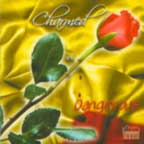
|
|
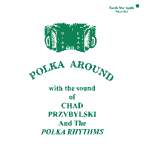
|
|
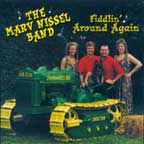
|
|
C
- "Everybody's Favorites" and "Something Old, Something New, Something Modern Too"
- (John Check and the Wisconsin Dutchmen, North Star Appli. NSA-226, [no date]) Dr. John Check's musical career dates back to 1935, when he formed his first band in a Wisconsin high school. Over the years, he performed and recorded with both the Michigan Dutchmen (when he lived in Michigan) and the Wisconsin Dutchmen (when he moved back to Oshkosh). This CD was transferred from two LPs of uncertain vintage. The "Lhanicka Polka" is done in a pure German brass band (blasmusik) style; the fine arrangement of the "Red Raven Polka" combines a touch of marching band, a dose of big band and a neat men's chorus; Russ Mikkelson lends an excellent vocal to the 1937 Tommy Dorsey hit "Marie." Most of the ethnic tunes (ten polkas, five waltzes, two laendlers, and a schottische) are in the German or Czech style, the remaining nine tunes are pop or big band. Musicians are credited, songwriters are not. The transfer to CD is not entirely successful, as there is noticable "wow" on two slow numbers. Pleasant and well-played. C+ [5-29-06] [Vendor: www.polkamart.com]
- Dance, Dance, Dance!
- (The Dujka Brothers, JMD Records JMD-1008, released 2005) The arrangements are wonderfully varied, the performing and recording are sharp, and the voices warm. No surprise there -- after all, this is the Dujka Brothers. The songs have a sweetness characteristic of bands that come out of the Texas Czech tradition. I love "This Song Is for Me and You," a patriotic song written by Daniel Klapuch -- it makes me want to stand up and salute. But having listened to other Dujka CDs, I'm ready for a bit less synthesizer (maybe they could take an analog drummer into the studio for their next recording). C+ [1-14-06] [John Dujka sent me a promotional copy -- a trend that I hope catches on with other musicians! Ordering information is on their website www.dujkabrothers.com or you can purchase through www.cdbaby.com.]
- Mother's Hands
- (Henny and the Versa J's with Ryan [Ogrodny], Jazzo 1007) Violinist Ryan Ogrodny, 12 years old when this CD was recorded, has some hot hands -- and accordionist Randy Koslosky found the perfect vehicle to show off those talents in the title track, "Mother's Hands," which the two have turned into a fiery tour de force. They worked similar magic with Mozart, turning the Rondo alla Turca (Sononta in A), into a dance bursting with passion. The rest of the CD is less interesting. C+ [1-30-05]
- Polkas Y Rancheras
- (Los Rancheros Del Norte, Maguey Music 4071) A mix of traditional (i.e., with bajo sexto instead of electric bass) and modern norteńo. I count nine polkas, five valses rancheras (waltzes) and two ballads. Less polished but more charming than Los Tigres Del Norte. Includes some nice duet vocals. C+ [10-19-03; revised 2-22-04]
- El Rey De Las Polkas
- (Tony De La Rosa, Hacienda HAC-7418) De La Rosa is one of the most important post-War Mexican polka artists. His tempo is gentle and his tone is sweet. Like many other greats of the past, he's not afraid to venture beyond the traditional repertoire, covering the old minstrel "Alabama Jubilee" (here called "El Circo") and Boots Randolph's "Yakketty Sax." I only wish there were some vocals to add variety. C+ [2-22-04 C; raised to C+ on 3-21-04]
- Best of Polka!
- (Walter Legawiec & The Polka Kings, Eclipse Music Group 64649-2) Back in the 1970's, Legawiec was a popular New Jersey violin teacher whose students still remember him fondly. Like Polka That's All, which I reviewed before, this CD features an impeccable big band playing polkas mostly composed by Legawiec. Between the two CDs, buy this one; it has the better melodies. C [2-22-04. Revised 11-12-04. Reduced from C+ to C on 10-4-05.]
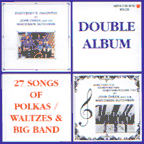
|
|
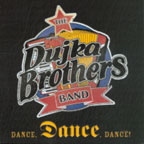
|
|
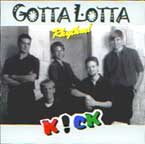
|
|
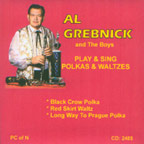
|
|
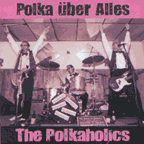
|
|
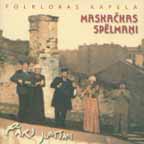
|
|
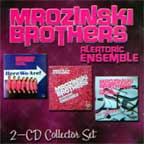
|
|
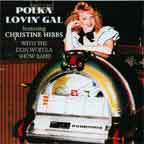
|
|
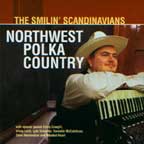 |
|
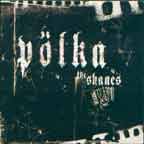 |
|
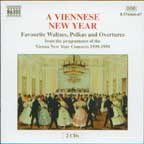 |
|
- Let's Dance
- (Ambrose Brothers Orchestra, Baba's Records BRCD-2051) Fiddle in front, backed by a rhythm section that has a solid "thump thump" to it. At first I thought, "Big deal, I've already heard that kind of sound from Peter Ostroushko." Then I got the connection: the Ambrose Brothers are Ukrainian-Canadians and Ostroushko is a Ukrainian-American. Anyway the album is a lot of fun. C [3-11-05. Would have been a B+ except for the "Roch-chuch-chuch-Polka" where they sound out of tune.]
- Blasmusik Zauber: Polka
- (Various artists, Koch Präsent 398-078) Blasmusik ("blowing music") is German brass band music. The typical ensemble might have 15-20 members and a repertoire rich in German and Czech polkas and waltzes. This particular compilation has tracks from twelve different bands, all performed and recorded faultlessly, yet I could find no charm or joy in it. Bands, composers, arrangers and publishers are credited, and timings given, but there are no further notes. C [11-6-04]
- The Best of Bud Hundenski and the Corsairs
- (Bud Hundenski and the Corsairs, Swing Time Music CD #2002) A generous seventy-seven minutes of solid Eastern polka music that is, in the final analysis, not very interesting. C [9-28-04]
- Ein Tag in Deutschland
- (The Continentals, [self published]) The Continentals started out playing German music in the early 70s, evolved into a more conventional Polish polka band in the 80s and 90s, and have now come full circle -- returning to their roots as a three-man combo playing German music. They have several nice songs on this CD. I enjoyed their version of Anton Karas's "Third Man Theme"; I like the gentle rock feel of "Die Berge die sind mein zu Haus," and "Boarischer" reminds me of those great rock instrumentals of the 60s. It was also good to hear "Seemann, Deine Heimat Ist Das Meer" again after all these years. Overall, however, I prefer a punchier sound. C [9-28-04. Revised 10-10-04] Note: You can read accordionist Mike Surratt's thoughts on polkas -- German and otherwise.
- Crispijn
- (Het Brabants Volksorkest [Brabant Folk Orchestra], Auvidis/Ethnic B-6827) Since 1978, Hubert Boone, founder and leader of the orchestra, has been diligently trying to resurrect the folk music traditions of Brabant, a thousand-year old duchy today divided between Belgium and the Netherlands. Though Boone's bagpipe playing on one of the polkas is an absolute delight, most of the music sounds like a quaint chamber ensemble. 24 tunes, 11 of which are polkas. C [8-25-04; revised 8-26-04]
- The Best of . . .
- (Stas Golonka and His Chicago Masters, Ampol Records AMCD-7002) A fine honky band, but they sounded better on Rick March's Deeper Polka compilation. Buy that instead. Contains 24 cuts, 74 minutes of music. C [Rated " B-" on 6-16-03; revised 9-12-04 and downgraded to C because the vocals sound awful]
- Polka Magic
- (Walt Procanyn Band, Eastwind 35) Eleven Eastern-style polkas, well played and well-recorded. Wally Balicki's clarinet solo is breathtakingly good. No other musicians are credited. Outstanding cover art, no liner notes. C [Rated " B-"7-13-03; reduced to C on 9-12-04 because it's just not very interesting]
- Romy Gosz 1935-1936
- (Romy Gosz and His Orchestra, Polkaland CD-602) Roman "Romy" Gosz, one of the most important bandleaders in east-central Wisconsin in the 30's, might be described as the father of mid-western Czech Bohemian music. But this collection of 20 tunes just doesn't move me -- I don't particularly like that pre-war old-timey feel, the sound quality is poor, and the liner notes are worse. C [5-3-04]
- All Wound UP!!
- (The Downtown Sound, Bel-Aire Records CD-44172) Sixteen tracks, containing a mix of country and familiar Polish tunes performed in Chicago style. Uninspiring. C [3-9-04]
- His First and Last Recordings
- (Don Santiago Jimenez, Arhoolie CD-414) Santiago Jimenez is probably the second most important name in the development of the conjunto style, the working class Mexican idiom that adopted the polka as an integral part of its repertoire. This, however, is a very strange CD: half was recorded in 1979, the other half was recorded more than forty years earlier. I prefer the more recent material, as the older tracks are a bit rough for my taste. There are thirteen polkas; as is typical for Mexican polkas, these are all instrumentals. Of the seven rancheras (sentimental ballads), four are sung to a polka beat. C [3-2-04; revised 3-9-04; revised 3-21-04]
- Too Much of a Good Thing?
- (Charm City Sound, CCS Records [no number]) Charm City Sound is a good, solid Push band that writes some excellent original material. I particularly like "Falling Again" and "Drink 'Til I'm Sober." The only drawbacks are that ubiquitous bellows-shaking on accordion and some vocals that are flat. C [1-4-04]
- Post Polka
- (Headless Household, Household Ink HI-133) I'm impressed that a terrific free-jazz ensemble would put out a polka album. These guys are really good; if only they leaned a bit more towards the polkas and bit less towards the free jazz, I'd like this album more. In spite of my rating, if you're interested in the nexus of jazz and polka, buy this CD. C [1-4-04]
- Polkas, Polkas, Y Mas Polkas
- (Los Dos Gilbertos, Hacienda Records HAC-7387) I'm still trying to get a handle on Mexican polka, so I tried this album of instrumentals in traditional conjunto style. Nice but they didn't knock me out. C [12-16-03]
- Polka That's All
- (Walter Legawiec & The Polka Kings, Eclipse Music Group 64650-2) Legawiec is a noted composer and violinist, father of playwright Stephen Legawiec. I like the peppy sound and the interesting arrangements. The engineering and performances (probably by a studio band) are first rate, but Legawiec must be saving his best melodies for his classical compositions because his polkas all sound alike. C [11-3-03, revised 11-18-03]
- Polka Can't Die
- (The Polkaholics, self-published 2003) Polkaholics leader Dandy Don Hedeker is a tireless promoter of polka music, helped in the compilation of my favorite polka album, American Polka, and brought L'il Wally back to Chicago to play the Zakopane Lounge. The Polkaholics sound is usually described as punk-polka but I think it's more heavy metal. Their latest album, Polka Can't Die, has several clever originals and some fine guitar work by Dandy Don, but I don't find the unrelenting sound of a power trio (Shite'n'Onions called them a "Chicago-based punk polka band w/Ramones overtones") keeps my interest for very long. C [10-19-03; revised 9-13-04; revised 10-11-04]
- Gone Polka
- (Jimmy Sturr, Rounder 82161-6103-2) My first album by the 600 pound gorilla of polka music today. Sturr has recorded over 100 albums and won more polka Grammy awards than anyone else. On this album he features singers Willie Nelson, John Karas, Brenda Lee and Arlene Crissan, backed by a tight ten-man band (a "big band" by polka standards). The arrangements, mostly by Henry Will, are outstanding and the musicianship unsurpassed. The packaging is attractive and there are real liner notes -- the most thorough of any polka album I've seen -- with the composers, arrangers and all the musicians fully credited. Only drawbacks are the album's short length (under 35 minutes) and MOR leanings. Read Amanda Fisher's review. C [I gave this a "B" on 5-1-03. Downgraded to "C" on 11-2-03 because it now strikes me as too close to easy listening. Revised 9-12-04.]
- Polkasonic
- (Brave Combo, Cleveland International CIR-1023-2) This is the album that won a Polka Grammy for Brave Combo. Their polka version of "Purple Haze" is extraordinary (it's also on the American Polka compilation) but the rest of the album is less satisfying. I don't like the originals "Polka Dancer" and "Conchita the Waitress," nor do I like their arrangement of "Down in the Valley." Even the graphics and liner notes are poor. Since their Humansville album is one of my all-time favorites, I had expected more from the Combo. C [Revised 10-19-03. Originally rated " B."]
- Eat Our Beans
- (The Garbonzos, Missouri Mule Music MM-0002) Novelty band playing a few polkas. Well recorded, packaged and performed but they ain't no Squirrel Nut Zippers. C [6-16-03]
- The Early Hits
- (Gene Wisniewski and His Harmony Bells Orchestra, Dala DLC-345) I bought this because I'm still trying to get a handle on Eastern-style polka. While I still don't have much to say about the genre as a whole, this album by one of the Eastern giants has 24 cuts, flawless playing, and a great period photo of Gene in the old days. On the other hand, the sound is poor and there are no liner notes. "Otworz Drzwi Polka" is a minor-key polka that really swings. "Pan Michalek Polka" is "Old MacDonald" sung in Polish. And "Czarownica Polka" sounds to me just like "Grodno in the Moonlight" by Those Darn Accordions. C [4-29-03]
- The Wave -- Khvilya
- (The Wave, self-published [no number]) Ukrainian polka band from New York. They have several nice tunes and several of the band members, particularly Kasia Mychajlyshyn, have attractive voices. Unfortunately, the arrangements and production are colorless. C [3-29-03]
- Polkatime: 20 of the Best
- Eddie Blazonczyk and the Versatones (Cleveland International, CIR 1003) "Happy Tappy" is a joy, and the album includes a nice variety of country tunes (J.D. Loudermilk's "Talk Back Tremblin' Lips") and Eddie B. originals ("Polish and Proud of It") but this album doesn't move me. Liner notes are useless. C
- Sunrise to Sunset
- (Desert Horizon, Canyon CR-8116) Native American polka (also known as "Waila" or "Chicken Scratch"). I really like the songs "Wally G." and "Flowers on the Wall" but the rest of the album is a bit unpolished for my taste. C
- Country Polkatime
- (Joey Miskulin, Intersound 9321) Joey is a longtime music business pro who worked on and off with Frankie Yankovic for many years. This album contains a couple of nice songs but has an overall sameness of sound that makes me think that Joey recorded most of the parts himself on synth. C [Read Toby Hanson's remarks.]
- Texas-Czech Bands 1929-1959
- (Various artists, Arhoolie Folkloric CD-7026) I really like some of the Adolph Hofner country-sounding stuff and "Krasna America" by Joe Patek's Orchestra. The rest of the album didn't move me. Good liner notes. C
- Pasos Dobles and Polkas with Mariachi
- (Mariachi Oro y Plata de Pepe Chavez, Para Musica PMCD-177) "Beer Barrel Polka" in Mexican style, but otherwise a bit schmaltzy. C
- Unidos Para Siempre
- (Los Tigres Del Norte, Fonovisa SDCD-6049) Los Tigres are the ultimate superstars of Norteño (northern Mexican) music. This album has plenty of polkas and plenty of concertina. The performance, arrangements and production are all highly polished -- unfortunately, you need to understand Spanish to appreciate the highly-politicized lyrics. Includes an attractive full-color booklet with practically no content. C
D
- Honky Holiday
- (Stas Bulanda's Dyno Chicago, K&C Events KCCD-104) The band sounds great but the vocalists (Stas Golonka, Chet Kowalkowski, Richie Gomulka, Stephanie Pietrzak, and Keith Stras) are not in good form. Slapdash production and no liner notes. D [3-11-05]
- Polcas de mi Tierra
- (Chango Spasiuk, Acqua AQ-022) Chamamé is a unique musical mix of African, European, and indigenous musical influences found in northeastern Argentina. The polka is an important part of the chamamé repertoire. Chango Spasiuk, whose ancestry is part Ukrainian, is the modern master of chamamé which he plays on accordion in a particularly fiery style, either solo or backed by a small combo. Charming but 'way too folkloric for me. Packaging is major-label quality. D [1-30-05]
- A Big Band Polka Extravaganza
- (101 Strings, Madacy AL-2-2435) I was hoping for something a bit over the top like RCA Victor's Stereo Action series but it's just easy listening. [8-30-03: D; 5-5-04: It's still easy listening, but not as bad as I remembered: D+]
- The Polka Beat
- (Johnny Prill, [self-published]) I frequently dislike the way well-known songwriters perform their own works. This CD is no exception. D [9-28-04. Revised 10-10-04.]
- Werbung, Baby!
- (Elãkelãiset, Humppa 010 / Stupido 042) Real Finns will no doubt laugh at my description; but when they're done, I hope they will drop me a note and correct my errors. Humppa is a traditonal Finnish polka-like folk dance, recently revitalized and rocked up by several Finnish bands, somewhat like Brave Combo has done with American polka music. Elăkelăiset seems to be doing well with genre, as they have been issuing CDs for about ten years. This attractively packaged CD contains seventeen tracks of energetic music fronted by a man with an unattractive voice singing about "Humppa" -- yes, it comes up in every song. D [11-14-03]
- 40 Years Later . . . Living on the Edge
- (The Little German Band of State College, Pa., [self published] LGB-6) Big brass band (about 25 pieces) with a lighthearted repertoire (e.g., "Happy Birthday" as a polka, the Oscar Meyer Wiener jingle). Too bad they don't always play in tune. D [11-3-03]
- Texas Bohemia
- (Various artists, Trikont US-0201) Having loved Trikont's American Polka album, this was a big disappointment. The sound quality is awful, there are too many slow songs and the lengthy liner notes are in German only. On the positive side, the CD is over 70 minutes, the notes list the date of recording or release (I wish everyone did that), 16 bands are represented and there's even a bit of hammered dulcimer. Interestingly, Trikont's US distributor is Other Music, best known as a source for alternative, indie, experimental and electronic music. My favorite song on the CD is "Corn Cockle Polka," credited to the Vrazels & Majeks & Bobby Jones Czech Band. D [4-8-03]
- Fantasztyczne
- (Li'l Wally, Jay Jay 5165) There's a joke about a woman who returns from her vacation complaining about the resort, "The food was absolute poison . . . and the portions were so small." The music on this CD is not poisonous, but the performances are sloppy, the CD runs only 34 minutes (a bit slender even for an LP), the vocals are mostly in Polish and there are no liner notes. D. [3-12-03]
Not rated
- How I Love Them Old Songs
- (Ron VanDenboom -- Family & Friends, Briarhill Records UPC 6-11483-79492-0, released 1999) Wisconsin native Ron VanDenboom has a warm and rich voice that matches well with the old time, country, rock 'n' roll oldie, and gospel tunes on his CD. There are just two polkas, both done in a gentle Slovenian style. Liner notes are complete, crediting all songwriters and musicians (including talented multi-instrumentalist Tom Brusky). I could have done without the children's chorus, however. Not rated because it's not a polka CD. [6-2-06] [Ordering information: www.ronvandenboom.com]
- For Diehards Only
- (Da Yoopers, You Guys Records 71169) Yoopers are residents of Michigan's Upper Peninsula (Upper Peninsula = U.P. = Yoopers. Get it?) Anyway Da Yoopers are known for the kind of songs we used to sing on the summer camp bus. They're either sophomoric or ribald, depending on your taste. I kinda like it. Not rated because it's not a polka CD. [9-10-05]
- Accordion Dreams
- (Various artists, Hacienda HAC-7586) Not a polka CD but a lovely compilation of Mexican button accordion music by familiar artists including Tony De La Rosa, Flaco Jimenez, Los Dos Gilbertos and Santiago Jimenez, Jr. The production is first-rate, sounding neither like a field recording nor a goopy Nashville session. The liner notes are bare-bones. Unrated because it's not a polka CD but recommended nevertheless. [8-26-04]
- Adijo Knapi
- (Orlek, RTV Slovenija DD-0278) Orlek is sometimes described as a Slovenian punk polka band. While there's only one polka on this album, it's one of the most enjoyable rock albums I've heard in years. Not rated because it's not a polka album. [7-13-03]
- The Squeegees
- (The Squeegees, [unpublished]) The Squeegees, a six-piece band out of San Francisco, don't have a real CD out yet but they do have this nifty demo they give to prospective clients. There are plenty of original novelty tunes by bandleader Tom Torriglia, one of the founders of Those Darn Accordions. I hope they get themselves a really good singer and head into the studio sometime soon. Unrated. [1-4-04]
- Exitos con Tradiccion Sinaloense
- (Banda El Recodo, Fonovisa Records 0883-51340-2) The brass and woodwind "Banda" style goes back at least as far as the 1940s in the north eastern Mexican state of Sinaloa. The traditional banda repertoire includes plenty of polkas, waltzes and marches. This CD, by one of the most famous banda groups, is nice but has too few polkas to be of interest to readers of this page. I'll look for something else to recommend instead. Not rated. [11-12-04][Some great information on banda can be found about halfway down this page.]
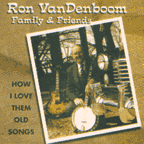
|
|
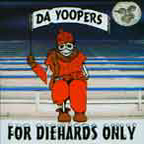 |
|
Genres and Artists
Starting in 1830s Bohemia, the polka took Europe by storm. It reached Scandinavia, the Baltic states, the Ukraine, the Slavic and Germanic-speaking countries, France, Ireland and Scotland. In other words, the polka blanketed Europe with the exception of the Iberian peninsula, the Mediterranean, and parts of the Balkan peninsula. In the late 19th and early 20th centuries, the immigrants brought it to the New World. In the United States the polka flourished, particularly among the Poles, Germans, Slovenians and Czechs. In Canada, the Ukrainians were important purveyors of polka. And from Mexico all the way down to Uruguay, wherever Germans went, the polka went with them. (Read Jolly James' brief essay on the spread of polka.)
- Chicago Honky
- In its day, Honky was a reaction to the modernized Cleveland/Slovenian polka. Artists like Eddie Zima and Li'l Wally Jagiello transformed the Slovenian sound by slowing down the beat and introducing Polish folk tunes to the repertoire. The classic Honky band had both concertina and piano accordion, but since the 1980s it has become more common to use just the piano accordion. Many people find Honky more danceable than Slovenian; I think it has more soul and sounds a bit like Dixieland Jazz.
- Chicago Push (or Dyno)
- Like Honky, Push is a Polish style, but with a snappier sound characterized by a double-time "bellows shaking" rhythm played on the accordion. You'll often find the lead played by two trumpets, the accordion carrying the rhythm, the bass line played on Fender bass and trap drums played in the style of a rock band. Major proponents are Eddie Blazonczyk and Lenny Gomulka. (Read what Jim Polaski says about the history of Chicago style and what Lenny Gomulka has to say about the role of the concertina. The Encyclopedia of Chicago also has a brief history of Chicago polka.)
- Cleveland / Slovenian
- "Quick, slick and Yankovic." Listen for two piano-accordions out front and a tenor banjo carrying the rhythm. Frankie Yankovic, the biggest name in American polka, modernized the sound of the Slovenian polka and spread it through all the polka-loving ethnic groups. He had several chart hits in the 40s and brought a high level of professionalism to his performances. Yankovic is to polka what the Beatles were to rock and roll. (Read what Tom Brusky says about how they play Slovenian polkas in Wisconsin. Allmusic has an informative paragraph about Slovenian music.)
- Conjunto
- A Mexican working-class musical style found in Northern Mexico where it is usually called Norteńo and in Texas, where it is called Conjunto. The modern Conjunto repertoire consists mostly of polkas and waltzes. Narciso Martínez is the pre-WWII father of the modern conjunto sound; Tony de la Rosa further modernized it in the post-war era and Flaco Jimenez went a step further by adding elements of jazz and rock. Flaco's younger brother, Santiago Jimenez Jr., prefers to maintain the pre-war Conjunto style. (See the article on the Thomson Gale site. Other references can be found at AMG. There's also an interview with Flaco Jimenez, where he talks about how Conjunto came out of Texas polka music.)
- Dutch Hop
- The traditional style, now virtually extinct, of the "Volga Germans" who emigrated to Russia in the 18th century and then to several states in the American west in the late 19th century -- most notably Colorado. Also found in Argentina. Typical instrumentation includes hammered dulcimer and accordion. Prominent artists included Adolph Lesser and Paul Weingardt.
- Eastern
- Starting in the 1920s, the urbanized Poles of the East-coast cities started turning away from the village-style (wiejska) bands, toward a more Americanized sound with the big-band instrumentation typical of the time. These "Eastern style" big bands, many from Connecticut, played a mix of Polish and American tunes. Prominent bandleaders included Frank Wojnarowksi, Bernie Witkowski, and Walt Solek.
- Extreme Push
- A new (2005) term for the more contemporary rocked-up sound of Push bands such as Polka Country Musicians, Change of Pace or Charm City Sound. This is a logical continuation of the innovations of Eddie Blazonczyk, who began mixing rock and country with polka many years ago. The genre is still in flux, as some proponents consider LynnMarie and Brave Combo to be part of Extreme Push even though neither are Push artists. [Note: A CD titled Extreme Polka was released on the Shot Glass label (Cleveland International) in 2003. There were only six tracks, performed by the Polkaholics, Polkacide, Brave Combo, Frankie Yankovic and Drew Carey, and Big Lou.]
- Hoolerie
- Hoolerie is a sub-genre of the Minnesota Dutchman style. Aaron Schuelke of WRJQ Radio says, "A Hoolerie band such as Erwin Suess, or Elmer Scheid specialize in 'Hoolerie' polkas, waltzes and laendlers. A Hoolerie is usually a concertina or clarinet solo or clarinet duet or even clarinet trio, with a trombone or bass trumpet walking along the bass line providing a sort of counter-melody in the background." (See what Mollie Busta says.)
- Humppa
- Humppa is "oom-pah" in Finnish, and refers to an indigenous polka-like music and the dance that is done to it. Elãkelãiset is a Finnish parody band that plays humppa, like Weird Al Yankovic plays polkas.
- Minnesota Dutchman / Czech
- It's that German oom-pah sound. The Dutchman bands seem to be built around concertina (lead), tuba (bass) and banjo (rhythm). The Texas-Czech bands are more eclectic: they're more likely to use electric bass, electric guitar and piano; and they will include the occasional Spanish or C&W song in their repertoire. The originators include Harold Loeffelmacher and Whoopee John Wilfahrt. The Polkamart website (which has a great selection of Germanic polka CDs) has separate categories for "Dutchmen," "Nebraska Czech," and "Wisconsin Bohemian/Oompah." Also read what Mollie Busta, Rick March, Mike Surratt, and Joe Rodgers have to say.
- Nuclear Polka
- For the last decade or so, bands have been experimenting with combinations of polka and rock. Leading the way has been Texas band Brave Combo, founded in 1979 by Carl Finch. Rounding out the Big Three of rocked-up polkas are the Polkaholics of Chicago and Polkacide of San Francisco. Also heavily rock-influenced are LynnMarie of Nashville and the Alpen Rock band die Schlauberger.
- Oberkrainer
- In the 1950s, Slovenian Slavko Avsenik and his brother Vilko formed the Avsenik Ensamble, a band that would have a profound influence on the music of Slovenia, Germany and Austria for decades to come. The band's style was nicknamed "Oberkrainer" (perhaps a play on "Kraine," the German name for the Kranjska region of Slovenia). To me, the music has a German "oom-pah" sound. In time, the Avseniks' hundreds of original compositions became a central element in the Slovenian-American ("Cleveland style") polka repertoire. Since 2004, global.kryner has been performing an updated playful version of the Oberkrainer style. Read a biography of Slavko Avsenik.
- Waila or Chicken Scratch
- The Native American music of Southern Arizona, mostly associated with the Tohono O'odham (formerly Papago) tribe. Walia consists of four dances: cumbia (a Columbian dance, by way of Mexico), , (polka) and mazurka. [One source says the dances include the watersaw and mazurka.]
- Paraguayan Polka
- The polka is the national dance of Paraguay, but you don't hear much about it here in the US. Carl Finch of Brave Combo says, "The polka in Paraguay is more like a huapango, which is three against four [beats]. You actually can waltz to it, although the dance looks more like a polka. It's not at all what we think of as polka." After listening to some of the beautiful polkas that Ramón Romero plays on the Paraguayan harp, Carl commented, "The rhythm is actually 3 on 2 (3 beats to a measure layered over two beats to a measure), instead of 3 on 4, but the 2 is very subtle here. If I remember, there's a singer from the 60s named Lupe [Perhaps Cuban-born "La Lupe" (1939-1992)?] . . . I remember her music moved in and out of 2 and 3 throughout, more like a Colombian Vallenata. Check out Bimonos de Oro. They make the most of that musical phenomenon."
- Polcalypso
- It is claimed that polcalypso developed in the Caribbean islands of St. Croix, St. Thomas and St. John, when the polkas of the immigrant Danes mixed with indigenous calypso rhythms. To my ears, it sounds more like Spooge (also "Spouge" -- a late 60s calypso-like style from Barbados) than like polka.
| Slavic | Germanic | Southwest |
| Polish | German | Mexican |
| Slovenian | Czech | Native American |
| Polish | ||
| Eastern | Chicago | |
| Honky | Push | |
The Versatones website refers to "12 main styles which include Polish, German, Bavarian, Slovenian and Tex-Mex that are played in North America . . ." Unfortunately, the other seven styles aren't named. By now (October 2004), I can recognize about eight styles: Conjunto, Scandinavian, Slovenian, German, Waila, Eastern, Honky, and Push. You can make an approximate timeline for polka styles. Before about 1930, the music consisted largely of the tunes and musical styles brought over from the old country. About 1930, the Eastern style emerged, influenced by the big band sound of contemporary American popular music. Following the Eastern style came the Cleveland or Slovenian polka about 1940, the Chicago Honky about 1950 and the Chicago Push about 1960. While the names of these four Slavic styles are well established, nobody seems to have named the stages in the development of Germanic or Hispanic polka.
Read Gene Mikrut on the diversity in polka music, and Paul Gifford on the various polka styles.
Q&A
- What is the polka?
- Well, these are just my opinions, but here goes . . .
- The polka is a dance and dance music. The polka is a lively couple-dance in a moderately fast duple meter. It probably began in Bohemia around 1830 as a round-dance. It soon swept Europe and was adopted by ballroom and art composers (e.g., the Strausses and Dvořák). By the late 19th century, European immigrants had brought it to North America. (See Maja Trochimczyk's essay on the history of the polka dance.)
- The polka is American. By the 20th century, the polka was passé in Europe but it was flourishing in America. It took root everywhere in the New World, from Connecticut to California, from Minnesota to Texas. In spite of the fact that polkas are played in Canada, Mexico, and even Paraguay, the U.S. hybrid is so vigorous that I would say that today's polka is "as American as mayonnaise."
- The polka is multi-ethnic. The polka is among the traditional dances of many ethnic groups in North America -- including the Ukrainians, Scandinavians, Germans, Czechs, Mexicans, Poles, and Tohono O'odham.
- For Polish-Americans, the polka is a focal point for ethnic identity. For most polka-loving ethnic groups, the polka is just one of several dances that they enjoy. But for many Polish-Americans, it has become a cultural icon, having replaced the church as the center around which communal and familial bonding is ordered. When working to promote cultural continuity, other groups might organize summer camps, parades, or language instruction for the children. Polish-Americans, on the other hand, go to polka dances with their families, sometimes wearing outfits of red and white, the Polish national colors.
- What's the difference between a "two step" and a "polka"?
- The way I understand it, the music is very similar, but the dances are different. Some ballroom dancers will choose to two-step or to polka based on the tempo of the music. Read what Mike Surratt has to say about polka rhythms.
- What are polka lyrics about?
- The writings of Joe Rodgers on Usenet (see alt.music.polkas) have persuaded me to take a closer look at polka lyrics. While my knowledge is still superficial, here's what I've learned so far.
- Joe points out that the Polish lyrics in most Polish-American polkas come from the folk songs of Poland. Those folk songs cover a wide range of themes such as insect songs ("Mosquito Polka" cf. "The Bluetail Fly"), gruesome tragedies ("Mountaineer's Farewell" and "Green Maple Polka"), and robber ballads ("Four Miles from Warsaw").
- American-written polkas present a radical departure from these themes, centering instead on dancing, drinking, and familial and romantic love. The "Down Home Polka," by Dan Gury of the Dynadukes, sings the praises of home and hearth in a way almost unheard of outside of the American polka.
- Polka presents an interesting contrast with country music. Since the days of Jimmie Rodgers, country lyrics have expressed feelings of wanderlust, conflict, loss, and heartache, as well as dealing with the topics of infidelity, crime, imprisonment, and death. Surely no polka would be titled "Take This Job and Shove It."
Joe was kind enough to write a critique of my conclusions about polka lyrics. He also notes that people looking for polka lyrics should start with the Li'l Wally Songbooks. Finally, be sure to check out James Leary's article, "Dialect Songs Among the Dutch."
- The marginalization of polka. What makes the polka so square, under-appreciated, slow to change and poorly documented?
- In the fall of 2002, I offered my thoughts on why polka music is so slow to change. I wrote:
-
Because its audience is stable, content and conservative.
In the early 1970's there was a paradigm shift in klezmer music (sort of the Jewish equivalent of polka). In a few short years, klezmer went from being grandpa's old-world music to being baby-boomers' hip music. I think the critical factors are that 1) the parents of the Jewish baby boom generation had already become assimilated and had discarded klezmer and 2) the kids had left home and left the old neighborhood. By the early 70s, klezmer was an anachronism rather than a daily reality; so, when the New Ethnicity hit, klezmer was adopted as a nostalgic connection with a romanticized past. Finally, The Klezmorim (the first neo-klezmer group) put R. Crumb's art on the cover of their first album and the boomers all understood that klezmer was now hip. (Read Matt Dziedzic on polka and klezmer.)In the polka world, things were different. The parents were less assimilated and still danced to polka bands. The kids were still living close to home and themselves danced to polka music at weddings and dances. The polka boomers were not so much interested in a New Ethnicity because they still participated in the old one. As a result, the polka world was not re-invigorated in the 1970's the way the klezmer world was.
I'm pleased to say that some people thought I had a good theory.
- Also in the fall of 2002, I speculated on why polka music is so poorly documented:
- Nobody writes about dance music. Serious writing about jazz doesn't begin until after World War I, when jazz moved from the dance floor to the phonograph. The same can probably be said of tango, rap, etc.
It wasn't such a good theory, and no one wrote to compliment me.
- In late 2003, I added Patrick D McMonagle's thoughts on "the decline of Waltz and Polka and renaissance of Swing among regular dancers. The reason is Nike® . . . When I was a kid in rainy Seattle I'd wear my wet leather-soled shoes into Safeway and nearly flip tail over teacup. Leather is really slick when wet. And when dry it is perfect for turning on a waxed wood dance floor. Then Nike® came along with soles that have better traction. At least better on a wet day and better for basketball. But they have enough more friction than leather that they hurt my knees when I constantly turn in the Waltz and Polka. So unless a dancer has really young and sturdy knees or likes to Polka enough to drop over $70 on a pair of shoes used only for dancing; they stop Polkaing 'cause it hurts. In other words, a change in the folk costume of America has changed the folk dance of America!"
- In April 2005, Joe Rodgers
theorized that the polka has
suffered because it's a hybrid and thus not fully accepted by either
Americans or Poles: " . . . [U]nfortunately, the Polish-American polka (and don't get me
wrong: I love it, too)
is sort of an "illegitimate child" of a marriage between Polish,
American and other types of music , not fully embraced, as Malinowski
said, by either its mother, Poland, or its father, English-speaking America
. . . and this is probably a major reason for its troubles today,
as its fan base is aging and dropping rapidly , while it enjoys no
reinforcements from the mother country, which considers it to be
foreign and substandard, or from most of the American public, which
feels the same way about it."
- As I continued to speculate on polka music's difficulties, I considered
whether they were the result of the polka being white people's music. I could see some parallels between polkas
and mummer (Philadelphia
string band) music -- both have similar European ethnic origins, and both have
suffered as their audience and musicians have assimilated and moved to the
suburbs. But other genres of white music (southern gospel, bluegrass,
heavy metal) seemed to have no such parallels with polka music. [While Keil
(p. 139) hears an African-American influence in Cleveland polkas, I remain
skeptical.]
- My current (November 2005) hypothesis is that the marginalization of polka stems from
the conservatism and anti-elitism of Polish-Americans.
- African-American music is "liberal" in the sense that it is rebellious, questions authority and promotes individual autonomy. This lack of traditional fetters allowed African-Americans to produce or contribute to an astonishing range of American music: ragtime, boogie-woogie, jazz, swing, blues, rhythm & blues, rock 'n' roll, soul, funk, disco, rap, and hip hop.
- In her book, Music in the Culture of Polish Galicia -- 1772-1914, Jolanta T. Pekacz writes at length about the conservatism of Polish Galicia and how that conservatism inhibited musical expression and creativity. If we presume that that conservative trait was characteristic of the Poles who immigrated to America, and was then passed on to their descendents, it could explain the glacially slow evolution of the Polish-American polka.
- Outside the Polish community, Americans looking to express their dissatisfactions (political, social, moral -- or just disappointment in love) would be more likely to seek expression for their feelings in African-American music than in polka music. Certainly, the explosive growth of rock 'n' roll in the post-war period seems to support this view.
- Ironically, conservative non-Poles would also be unlikely to seek expression through the polka, as they would be more likely to seek outlets within their own ethnic or cultural traditions.
- By contrast, classical music is plenty conservative and still seems pretty robust -- at least in comparison to the polka. Why is that? Again we turn to Pekacz, who writes about the rigid caste system -- the social stratification -- of Polish Galicia. One aspect of that caste system which is hard for Americans to appreciate is its disdain for social climbing. One knew one's place, appreciated one's place, and did not aspire to "move up." Similarly, Polish-Americans have shown no interest in "upgrading" the polka to appeal to a tonier audience. As a result, the climbers go elsewhere, perhaps to the Philharmonic, the opera, or the art galleries.
- Thus, the marginalization of the polka probably results from the conservatism and anti-elitism of the Polish-American community. Q.E.D.
Interestingly, a few post-punk musicians, having become bored with all the other musical genres, turned to the polka -- partly because it was so uncool and marginalized. A few (e.g., Rotondi) went on to other things; some (e.g., Brave Combo, the Polkaholics) fell in love and stayed. [See Rick March's comments.]
- Why is polka music so regionalized?
- American polka is still primarily live music performed for actual dancing. Its dissemination tends to be limited to the distance a band is willing to drive for a gig -- figure a couple hundred miles, tops. The few bands big enough to sustain national tours (Yankovic, Sturr) were influential outside of their home-base regions.
- Do all polka bands sound the same?
- Goodness, no! Here are some American polka artists who I think sound totally unlike one another: Group Papago, Karl Hartwich, Charm City Sound, L'il Wally, Los Tigres del Norte, Polka Country Musicians, Polkaholics, Dick Rodgers, Bernie Witkowski, and Frankie Yankovic. Outside the U.S., you might try Chudoba, global.kryner, Los Gauchos de Roldán, Ramón Romero, or Chango Spasiuk.
- What is the state of the polka today (November 2005)?
- I couldn't find a good answer to this on the Web, so I decided to try to answer it myself. First I gathered some data by asking Jim "Jimmy K" Krzeszewski some questions:
- How many new polka CDs do you think came out this year?
- There were about 100 CD releases in the past year sold at Jimmy K Polkas. However, we do not handle every Polka CD that is released. There are many local and regional bands that release CDs on their own that we do not handle. Typically I'll use my judgment on what to handle (or not to), and if we receive more than one request for a band we don't have, we try to obtain the CDs.
- Now, regarding these releases, there are several "re-releases" in the mix. Not all are new studio recordings.
- How does that compare to 5 years ago?
Ok, as for how it compares: I would say the new releases are slightly down, but not dramatically. This is purely due to a few bands dropping out that were once active on the recording scene (the Dynatones, for example).- How many polka CDs do you think are in print at this time?
- How many CDs are in print? Wow, good question. We handle about 1,000 I believe, and there are others. I'd say 1,200 to 1,500 would be a fair guess, but I could be way off.
- How does that compare to 5 years ago?
- Comparing now to 5 years ago, that is a dramatic difference. There were probably 300-400 CDs on the market 5-6 years ago. The big change is somewhat due to new releases, but mostly due to older recordings being released in CD format as times change.
Here are my thoughts:
- The Dutch Hop is extinct, in the sense that there are no active bands that specialize in this genre.
- The honky-style polka is an endangered species. The practitioners are aging and are not being replaced by younger musicians.
- Otherwise, the polka is reasonably healthy; it's not going to die anytime soon.
- The slow dropoff in dance attendance will continue.
- Based on the pictures of polka dances that I've seen, the audience is younger than I expected.
- Many people on the Internet (i.e., Usenet) have expressed the view that's what wrong with polkas today is that the bands show a lack of innovation and promotion. Jim Polaski has articulated this position particularly well.
- I envision the polka world as divided into "old audience" and "new audience." Bands that appeal to the old audience are really limited when it comes to growth or change. Rick Nelson complained about this in "Garden Party" back in 1972-3. "New audience" bands like Brave Combo, the Polkaholics, and Polkacide are freer to explore new directions for the polka. On the other hand, Freeze Dried seems to have been pretty successful at appealing to the old audience, which stretching the polka borders.
- The most interesting new polka bands are coming from Europe: Austria, Germany, Poland, and Slovenia.
- Should the polka be de-ethnicized?
- The polka world is changing. The ethnic groups that once danced the polka in places like Buffalo, Pittsburgh, Baltimore, Milwaukee, Cleveland, or Chicago started leaving for the suburbs decades ago. Nearly all the polka clubs are gone from those cities, as well as most of the bands. There is no more Polish Broadway.
- In response, polka lovers have been struggling with what to do so that the polka might regain -- or at least preserve -- some of its glory. One particularly emotional part of the debate has been over the ethnic character of polkas.
- Here are some of the arguments, pro and con.
- PRO: The name "polka" should be replaced because it evokes ridicule. Similarly "Salsa" was a new marketing term successfully used to promote Latino music from the Caribbean during the 60s and 70s.
- CON: A new name only turns off the die-hard fans who go to the dances, buy CDs, and join the polka organizations. And the Spanish word "Salsa" didn't de-emphasize the Latino origins of the music, but instead blurred regional distinctions (the word included both Cuban and Puerto Rican music). The word "polka" already does that.
- PRO: De-ethicizing polkas would increase their appeal to Americans (particularly younger listeners) who don't identify ethnically.
- CON: In a Penn State University interview, Alex Meixner says that some of polka's practitioners, in an attempt to achieve mainstream popularity, have tried to de-ethnicize the music. "But," says Alex, "it's the ethnic element that makes it worth preserving." [Thanks to Joe Rodgers for bringing the Meixner interview to my attention.]
- PRO: English lyrics should be emphasized to make the music more accessible. After all, Frankie Yankovic recorded and performed mainly in English.
- CON: Polish lyrics ought to be be promoted because they have the emotional power to stir the hearts of the listeners. And the new energy brought to polkas by Li'l Wally was driven by his unapologetic association with his Polish roots and frequent use of Polish in his singing and recording.
- Where does Lawrence Welk fit into the polka world?
- Lawrence Welk was a popular and successful accordion player, big-band leader and businessman. While he exposed millions of television viewers to polka music, his inclination was more towards American popular music. As a result, he wasn't very influential in the strongly ethnic polka world.
- And what about Roman Lankios?
- Ok, so no one would actually ask me this but Ukrainian-American Roman Lankios plays the continental xylophone and he's terrific. I hope someone invites him to play on their polka album. It would be a hoot!
- How do I rate CDs?
- Here are the grades I give and roughly what they mean:
- The process is of course subjective. It should go without saying that I like interesting song selection, good musical performance, varied arrangements, professional recording, mixing and mastering, complete liner notes, and quality graphics. But beyond that . . .
- I don't have any strong genre or ethnic bias. I make an effort to track down quality polka recordings in all styles. If you feel I've overlooked a particularly good polka CD, feel free to drop me a note.
- I may have a slight preference for English lyrics because that's the language I understand but, if you look at my ratings, you'll see plenty of non-English CDs at the top and several English-language CDs at the bottom.
- I don't have strong feelings for or against traditional polka tunes since I didn't grow up with them. On the other hand, if I already know all the tunes on your CD, I'll get bored pretty quickly.
- Because I'm relatively new to polkas (started in 2002), I love compilations. They're a great way to learn about different styles or different bands, and often provide great value for the money.
- In my opinion, the thing that most sets apart the top polka bands from the also-rans is the quality of their vocals.
- I seldom actually take off points for bad graphics, but you can be sure that my decision to purchase a CD has often been influenced by good graphics.
- I try to make sure that the CDs at the top of my list are those I would purchase again, or take with me to a desert island, or recommend to a friend.
- I like albums that sound as good to me the tenth time as they sounded the first time I played them.
- I really wish there were more historical and folkloric CDs that I could recommend, but I can't get past the poor sound quality of many CDs of historical interest, or the primitive arrangements typical of folkloric albums.
- Why did I begin this web page?
- I started putting my own polka reviews online around October of 2002, because I couldn't find any polka album reviews on the web, which I found frustrating because I'm interested in buying more polka CDs. The more I thought about it, the more I realized that the whole state of polka writing (that is, writing about polkas) is abysmal.
- BOOK
Enemies of Sleep: New Ulm Musicians - (Dale Holtz with Kathleen Lorence, self-published, 2004) Author Dale Holtz grew up in the New Ulm, Minnesota, area in the 1930s and 40s, listening to and later playing in the German and Czech bands that made the region famous. Drawing on his own memories as well as interviews, he tells the stories of more than two dozen local bands and musicians -- including Whoopee John, The Six Fat Dutchmen, Babe Wagner, Peter and Paul Wendinger, and Fezz Fritsche. The book is primarily a memoir, but I also learned a lot:
- Holtz was very much influenced by the "Old Time Music" he and his neighbors heard on the radio in the 1950s and 60s. He doesn't say just what "old time" meant, but I'd guess that it was the popular music of the 20s and 30s. By contrast, I've never heard Polish polka enthusiasts talk about "old time" music -- I think they were more influenced by the big bands of the 1930s and 40s.
- With all the drinking that surrounds the polka, I've often wondered whether there was a lot of fighting. Holtz is quite candid, saying "Fights were quite common in the ballroom scene . . . At the Palms in Renville, I remember fights in at least three of the corners of the ballroom at the end of the night."
- Holtz says that most New Ulm vocals were sung in English rather than German, but that the Bohemian or Czech bands often sang in Czech. What an interesting observation! I wonder what led to the different language preferences. Could it be a result of there being more Germans in the U.S. than Czechs, and their arriving earlier?
- Charlie Sunde, who contributed a chapter to the book, laments that he was born of Norwegian stock in Iowa rather than in a more "ethnic" (his word!) German, Czech, or Polish town.
- In the chapter on Elmer Scheid, Holtz says that "Hoolerie is the closest music style to the Dixieland sound." Does that make Hoolerie the Germanic equivalent of Honky?
- Finally, Jim Polaski will love this quote: "How did the Six Fats become so popular? No one promoted a band the way Harold Loeffelmacher did."
- As the only book on this seminal part of polka history, this is a must-read. [9-6-06] [Vendor: www.polkamart.com]
- BOOK
Fiddling for Norway: Revival and Identity - (Chris Goertzen, University of Chicago Press, 1997, ISBN 0-226-30050-1) To me, the most interesting aspect of this work is not it's coverage of Norwegian polkas (there's some), but the description of the Norwegian folk revival, the organizations that fostered it and how they handled their conflicts, and the national fiddle competitions that have been held for over 80 years. Perhaps American polka-lovers could follow the Norwegian example and promote our beloved music as a uniquely American folk music genre. Author Chris Goertzen is very thorough, covering the regional variations in Norwegian folk music, the history of the Hardanger fiddle vs. the regular fiddle, the Gammaldans controversy, and much more. Includes notated melodies for 127 tunes. [8-20-06]
- JOURNAL
Polish American Studies, Vol LXI, No. 2, Autumn 2004 - (Polish American Historical Association, ISSN 0032-2806) In the fall of 2004, the Polish American Studies journal devoted an entire issue to the polka. For me, it was essential reading, giving me new insight into Polish-American culture and its connection to the polka. Guest editor Ann Hetzel Gunkel (she's a professor of Humanities and Cultural Studies at Columbia College in Chicago) begins the volume as follows: "Polka is perhaps the most misunderstood, misrepresented, and mocked popular musical form in American history. Contrary to popular opinion, Polish-American polka is not Polish but a uniquely American cultural hybrid of ethnic styles and popular forms." This slim, hard-to-find publication contains articles or reviews of three important works from the polka literature: The Clarinet Polka, Horn Man, and Hoopi Shoopi Donna -- as well as several other compelling essays. Along with Polka Happiness, it's a must-read. [8-5-06]
- Polka Happiness
- (Charles Keil, Angeliki V. Keil, Dick Blau; Temple University Press 1992) Covers the post-war American polka scene. The interviews and Blau's photographs give a real feeling for "Polonia," the Polish-American communities that nurtured the polka and its adherents. I love this book but find its unevenness (it's basically a pastiche of materials written over twenty years by its three authors) and limited coverage of non-Polish polkas frustrating. [10-10-04] Also read what the Free Reed Review has to say.
- A Passion for Polka: Old-Time Ethnic Music in America
- (Victor Green, University of California Press, 1992) A history of American polka music, emphasizing the period between the world wars. Covers Poles, Czechs, Scandinavians, Italians, Jews and other immigrant groups. Thorough, scholarly, unromanticized and extensively footnoted. Dry but not boring. This is the best-written book in the field; too bad that it stops in 1960. [Revised 10-10-04] See Robert Walser's review of Polka Happiness and A Passion for Polka.
- Colorado Dutch Hop Music Arranged for the Accordion: The Music, History, and Culture of Colorado's Germans from Russia
- (Kurt Edward Goldenstein, 2000: self published) More than 100 songs arranged for accordion, recipes, photographs, history, bibliography and who knows what else. I wouldn't say that the book was elegantly produced, though the music engraving was professionally done. Nonetheless, it's as rich and flavorful as a good borscht. The book is available together with Goldenstein's Dutch Hop CD from The American Historical Society of Germans from Russia (www.ahsgr.org). At only $30 for the pair, it's a bargain. [6-29-04]
- Down Home Dairyland: A Listener's Guide
- (James P. Leary and Richard March, University of Wisconsin Press, 1996) Thank goodness this thing's back in print! Folklorists Leary and March write about the rich musical traditions of the upper midwest (mainly Wisconsin), covering the music of the Germans, Scandinavians, Finns, Poles, Hmong, and Native Americans among others. At least half of the book will be of interest to polka-lovers. Plenty of stories and wonderful pictures. [10-10-04]
- American Polka [liner notes]
- I'm grateful for the thorough liner notes that accompany the American Polka CD. They were one of my first sources of information about polka music.
- Music in the Culture of Polish Galicia, 1772-1914
- (Jolanta T. Pekacz, University of Rochester Press, 2002) It's not a polka book -- polkas aren't even listed in the index, though they're mentioned in the text -- but essential for understanding Polish-American culture. At least it was for me. [11-7-05]
- Dzieła wszystkie [Complete Works]
- (Oskar Kolberg, Wrocław-Poznań: Polskie Towarzystwo Ludoznawcze, 1962-8. Originally published in 1857-1888. 68 volumes.) I haven't actually seen this work but it is, by reputation, the last word on Polish folk music. Some volumes can be purchased used (see bookfinder.com). The Oskar Kolberg Institute is publishing about 20 supplemental volumes, most of which are expected by 2009 (at least that's what I think they're doing -- my Polish is weak).
- Mollie Busta's excellent article on polka music.
- Lenny Gomulka's site has five polka articles from Billboard magazine.
- Ann Hetzel Gunkel, Ph.D., gives lectures about polka music. In 2000, she gave a lecture entitled "Polka As Counter-Hegemonic Ethnic Practice." In 2003, she spoke on "The Virtual Ethnic Neighborhood: Polka as the Next Blues." She has contributed a paper by that name to the upcoming Polka Theory: Perspectives on the Will to Party, edited by Charles Keil (University of Chicago Press. Forthcoming, 2004). Her paper has also been published in the scholarly journal Popular Music and Society [cite: Ann Hetzel Gunkel, "The Polka Alternative: Polka as Counterhegemonic Ethnic Practice." Popular Music and Society, Vol. 27, No. 4, 2004 pp. 407-427], which you can now read on the Web at findarticles.com.
- In 1984, Musical Traditions published "In Pursuit of Polka Happiness . . . and a classless culture?", a Marxist analysis of polka music, partly based on a paper presented by Angela Keil at a conference of the Mid-Atlantic Radical Historians Organization.
- Dialect Songs Among the Dutch [i.e., Germans] by James Leary, University of Wisconsin-Madison. Sound clips that accompany Leary's article.
- David J. Jackson's "Just another day in a new Polonia: contemporary Polish-American polka music -- Audio Review Essay" from the British journal, "Popular Music and Society" (vol. 26, no. 4 / December 2003; pp. 529 - 540).
- David J. Jackson's paper, "Polka Music and the Polish-American Ethnic Community Since the 1950s" -- includes a discussion of polka lyrics
- Wally Dombrowski on the Art and Business of Polka and Why it is Hot Again (from 2004).
- "The Old Neighborhood Isn't the Same Any More: The Evolution of Polish-American Ethnicity" article by Deborah Anders Silverman
- Abstract of Brian A. Cherwick's dissertation, "Polkas on the Prairies: Ukrainian Music and the Construction of Identity."
- The Accordion and the Polka in Polish-American Ethnic Music by Roy S. Czernikowski
- "The Origins and Stylistic Development of Polish-American Polka Music." This dissertation by Janice Ellen Kleeman has been cited by several authors (here is the DDM citation)
- Erik Raichle is something of a polka visionary. I like his description of the development of the polka.
- Article on the Chemnitzer Concertina by Steve Litwin and Mark Kohan.
- Slavonic Web's article about the tamburitza.
- "Jim Kirchstein asserted that every town in Wisconsin had a rock group and polka band and therefore these were the two musical genres upon which Cuca [Records] concentrated." See the article at the University of Wisconsin website. The University of Wisconsin also has an online discography of Cuca Records.
- Chris Travis' interview with George Koudelka includes a history of polka music in Texas.
- Carlo Rotella's Washington Post article about Chicago polkas
- 247polkaheaven.com's media kit includes a discussion of polka people.
- Rick March's article, "Polka: Wisconsin's State Dance."
- Maja Trochimczyk's essay on the history of the polka dance.
- Glossary of traditional Nordic folk dances -- including polkas, of course!
- Interview with Big Lou on the Let's Polka blog.
- Robert Andrew Powell's article about L'il Wally, from the Miami New Times, 12-9-1999.
- Les Carpenter's Washington Post article about L'il Wally's song, "Let's go, Go-Go White Sox."
- New York Times article about Jimmy Sturr and the polka Grammies, 2-5-2006. Includes a brief video.
- Long article about accordionist Gary Sredzienski by
- Prime Time Polkas maintains a list of new Cleveland-style recordings.
- Jimmy K has a list of new polka releases as well as a Polka Top Ten List. (I've bought from Jimmy K many times and have always been pleased with his very quick service.)
- 247polkaheaven.com has an annual "Best of" list
- A fine source for German recordings that can be hard to get in the US is abella. Mimovrste will ship you CDs from Slovenia. Markski in Chicago carries a good selection of contemporary Polish CDs.
- See Michelle Genrich's list of Internet polka shows
- There's regular polka programming on TV, through the RFD-TV network, carried by DIRECTV, DISH Network and many of the smaller cable systems (always check availability before ordering service). [Thanks to Joe Rodgers for bringing this to our attention.]
- Website for Lisa Blackstone's film "Polka Time." Includes text, links, viewer comments.
- Les Blank's polka film, In Heaven There Is No Beer?
- Craig DiBiase and Timm Gable have finished their film It's Happiness: A Polka Documentary. They don't have distribution yet, but you can drop them an email if you want to purchase it on DVD.
- Polka from Cuca is a feature-length documentary about the Wisconsin polka scene, produced by Dave Erickson and Ootek Productions.
- The Worlds Most Dangerous Polka Band, directed by Sonya “Sonny” Tormoen, won "Best Documentary Short" at the 2006 Fargo Film Festival.
- Schulze Gets the Blues is a German film about a man who loves playing polkas but finds a new love in Zydeco. I haven't seen the movie, but it sounds like Jungle Fever to me. Fictional.
- "The Last Polka" was a Showtime parody starring John Candy and Eugene Levy as the Shmenge brothers, two Leutonian musicians in the Happy Wanderers polka band. Based on a series of sketches from the old SCTV weekly comedy show. Available on VHS from Amazon as "The Shmenges: The Last Polka." Here's a Schmenge Brothers video clip from the TV show.
- Down Home Dairyland -- encyclopedic coverage of Midwestern polka music by Rick March.
- Dick Blau's Polka Happiness website.
- Jimmy K's Polka Memories website, featuring historical photographs of polka musicians and polka dances from the 1970s and 1980s.
- Polka halls of fame that have websites:
- Polka Music Hall of Fame (Polish, Slovenian and Dutchmen styles. Chicago. Founded 1969.)
- National Cleveland-Style Hall of Fame (Slovenian style. Euclid OH. Founded 1987.) See also Richard Wagle's description.
- Wisconsin Polka Hall of Fame, founded 1995.
- (There's also a World Concertina Congress Hall of Fame.)
- The DMOZ list of polka websites.
- Ask Zosia -- the polka world's lighthearted advice columnist.
- Hans Klufendorfen Polka Ensemble is a fake polka band: think Spinal Tap or the Schmenge Brothers.
- The University of California at Santa Barbara is transferring old cylinder recordings (including about 30 polkas; all are from before 1921) to .WAV and .MP3 format. And you can listen online! (Thanks to Bill Wollheim for this tip.)
- Michelle Genrich's Polka E News is becoming an excellent source of polka news, videos, chat, events and lots more. Also check out the new Let's Polka blog by Anna and Chris Saccheri.
- Every band should have a web page. If you need help, talk to Tom Brusky, Becky Bukowski, -- or me!
- CD Baby, besides selling your CDs, can serve as your digital distributor (i.e., they'll get your music onto the big download sites and arrange for you to get paid). They also have thorough information on the laws and procedures related to digital distribution. You can even get a barcode for your CD through them.
- Procedure for submitting a recording for consideration for a GRAMMY Award. Information on NARAS membership.
- Submit your album data to the Gracenote Media Database (CDDB).
- CD Baby also has a page on promotion -- complete with a list of books on PR, marketing and publicity for the musician.
A+ = Buy it right now!
A= Buy it
B= Enjoyable
C= Nothing special
D= Substandard
E= Feh!
The few books in print are wholly inadequate (there is no Rough Guide to polkas). The liner notes with most polka CDs don't list the dates of the recording sessions nor the names of the musicians. Even the otherwise-exhaustively-thorough All Music Guide is limited to about six polka artists.
I can only hope that I make some small contribution to changing the current state of affairs. After all, I put up the first page on the Web devoted to Sam the Sham and the Pharaohs in the mid-90s. Now there are about six different sites that cover their career.
Bibliography
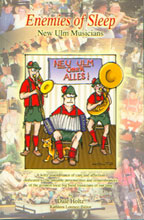
|
|
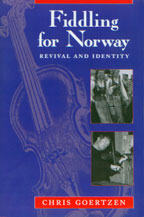
|
|
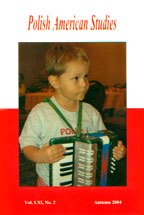
|
|
Polka links
On September 1, 2001, in Cambridge, Ohio, Judge John Nicholson found defendant Alan Law guilty of disorderly conduct and ordered him to pay a $100 fine or listen to four hours of Frankie Yankovic. The story so intrigued me that I bought my first polka album. The rest, as they say, is history. [Here's a version with pictures.]Polka scholarship
Articles about polka artists
Polka recordings
Polka broadcasts
Polka films and videos
Polka-related websites
For musicians
Everything here is based solely on my own opinion. If you spot any errors, please drop me a note. You're also invited to share your thoughts about your favorite polka albums. Please email Barry Nostradamus Sher.
May all your days be polka days!
Copyright (c) 2006 Nostradamus
Advertising.
Thanks to Tom
Brusky for the MIDI version of "Irresistible You" that I used
on this page for several years.
Last updated 11/26/2006
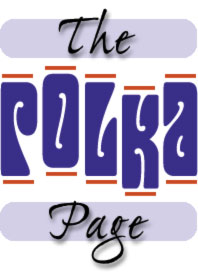 "All I can say is what a cool concept for a web page. Obviously you put a good
deal of time into what you do and it shows. Thank you for the gracious mentions and thank you for putting
construction time in for polka music. I for one truly appreciate all of your efforts. I've been
meaning to send this note your way for quite some time but shame on me."
"All I can say is what a cool concept for a web page. Obviously you put a good
deal of time into what you do and it shows. Thank you for the gracious mentions and thank you for putting
construction time in for polka music. I for one truly appreciate all of your efforts. I've been
meaning to send this note your way for quite some time but shame on me."